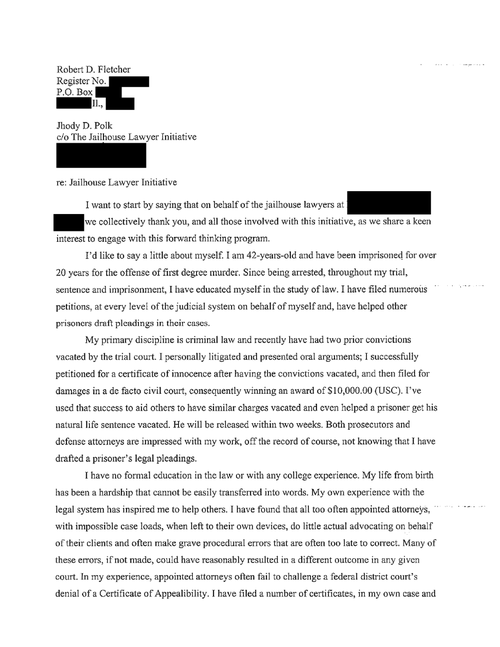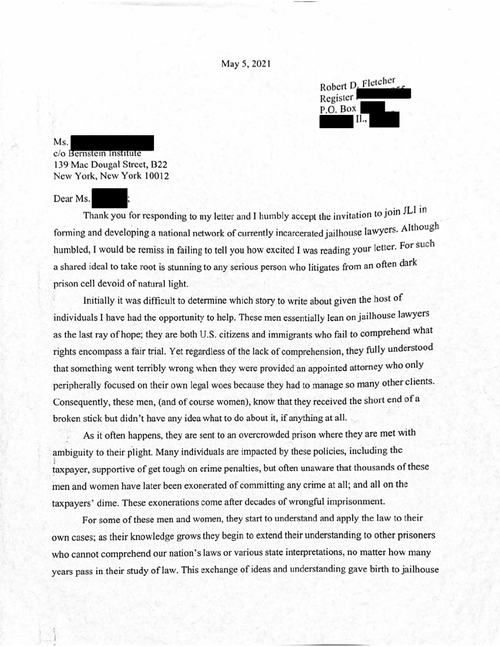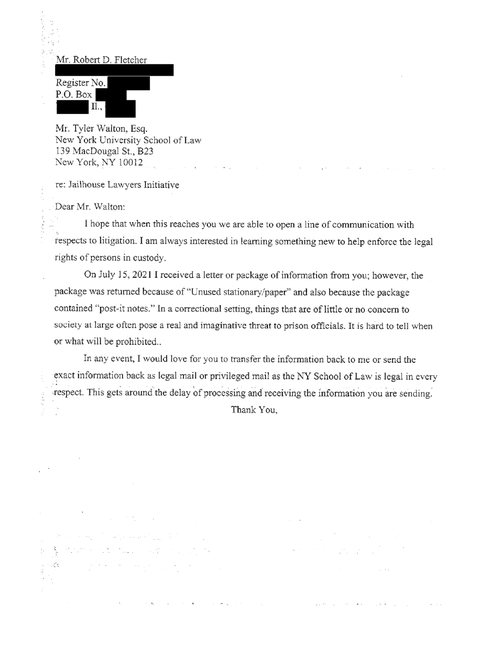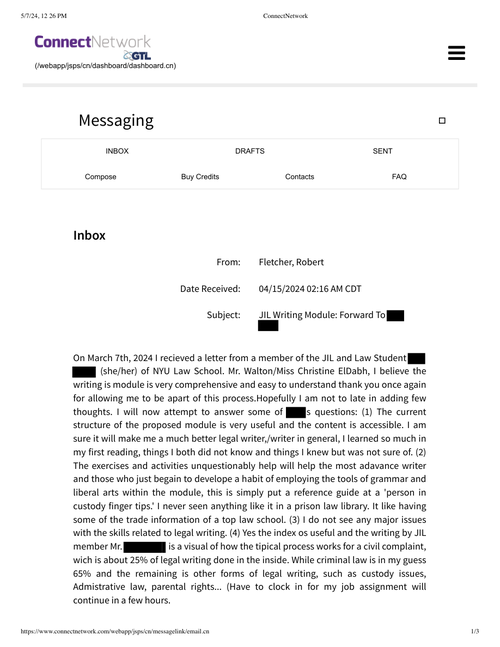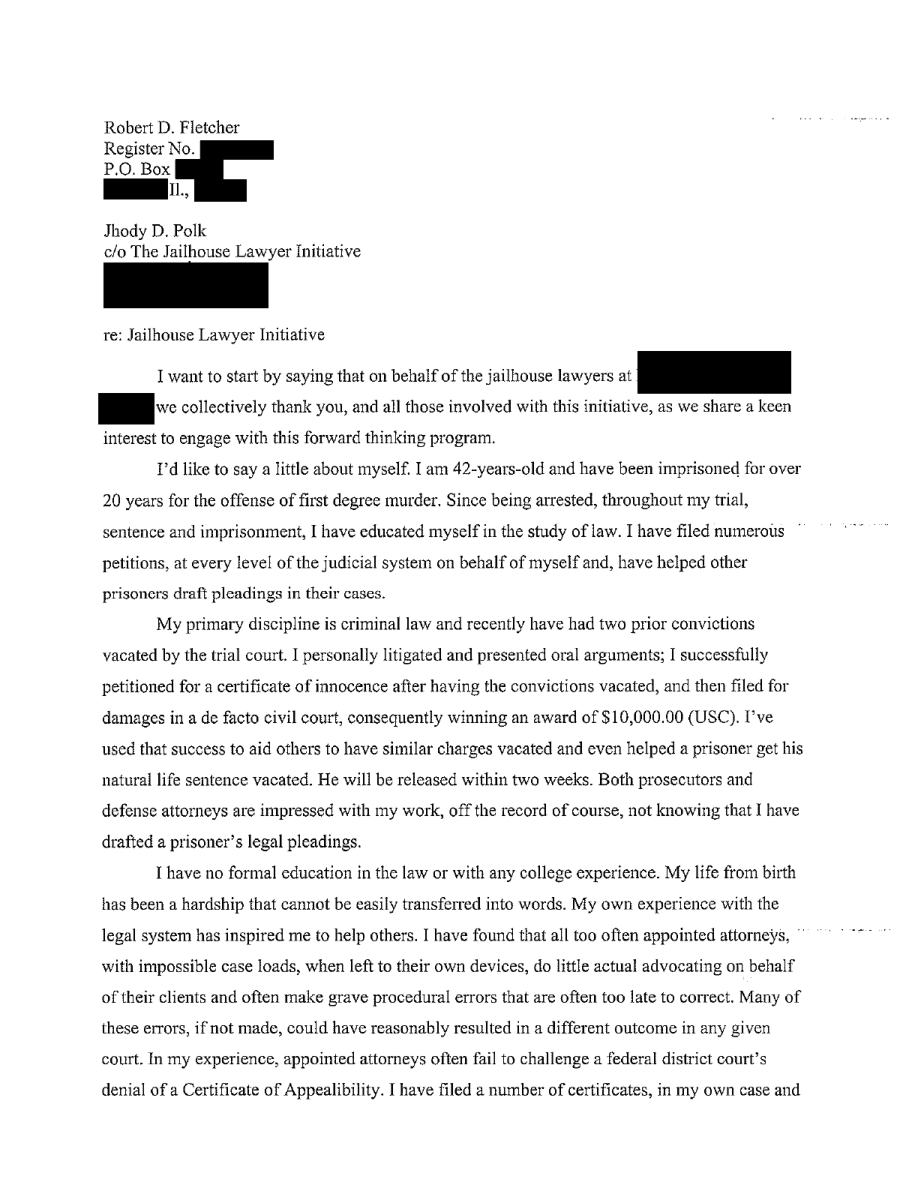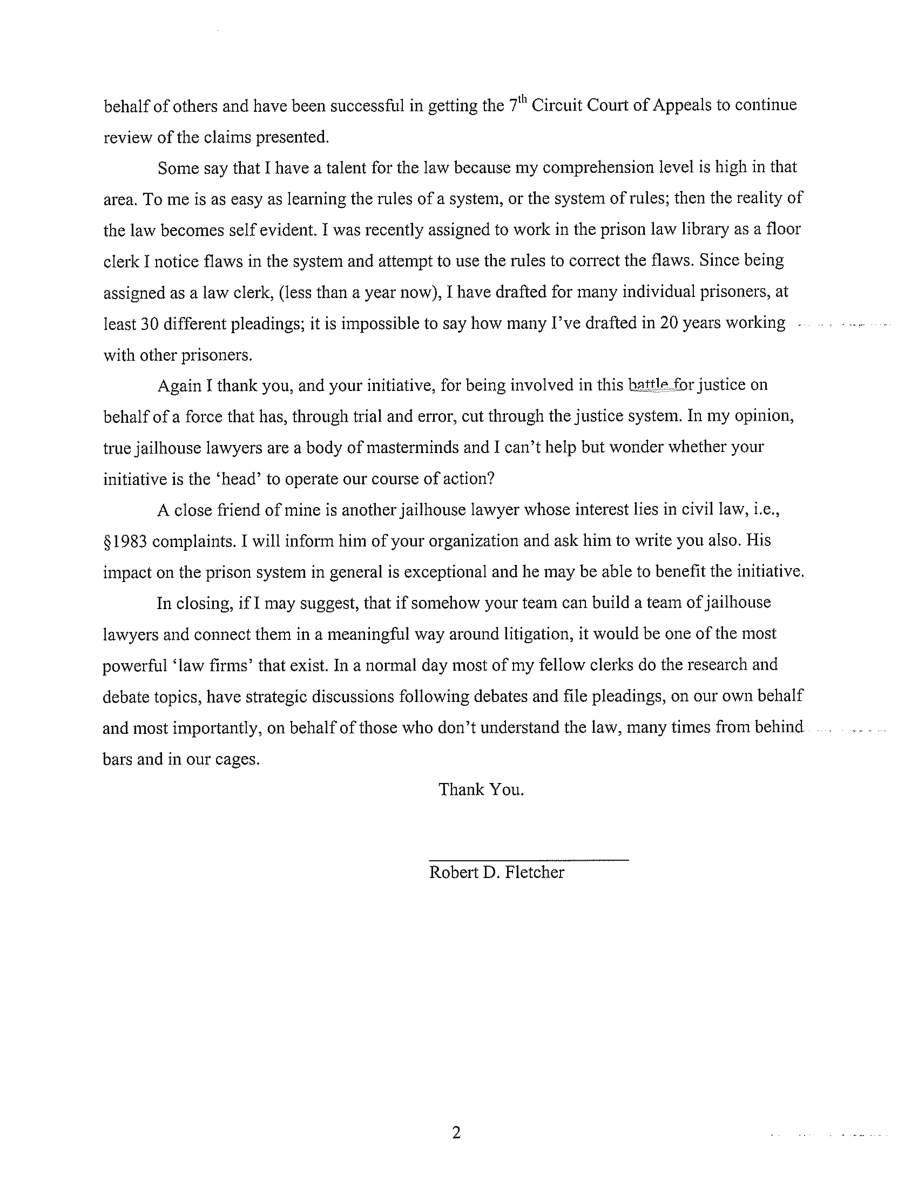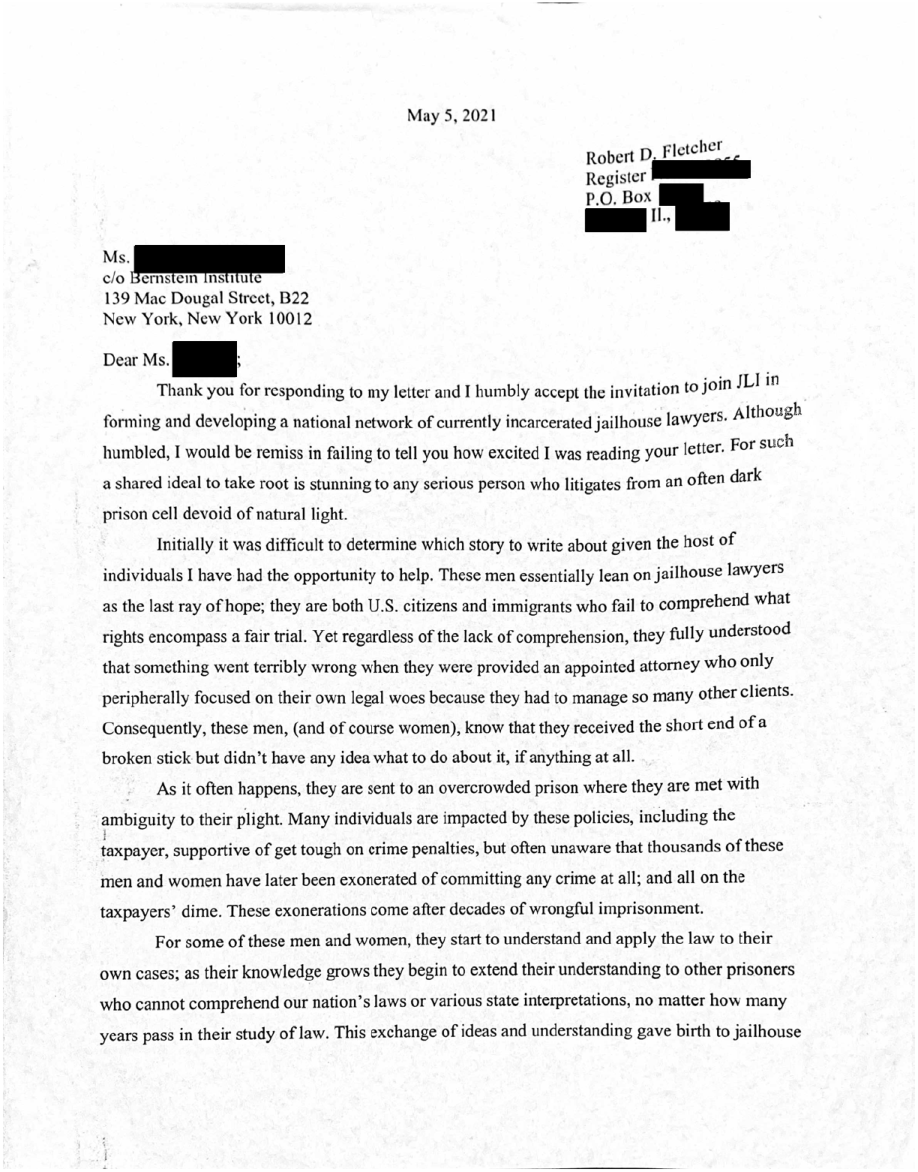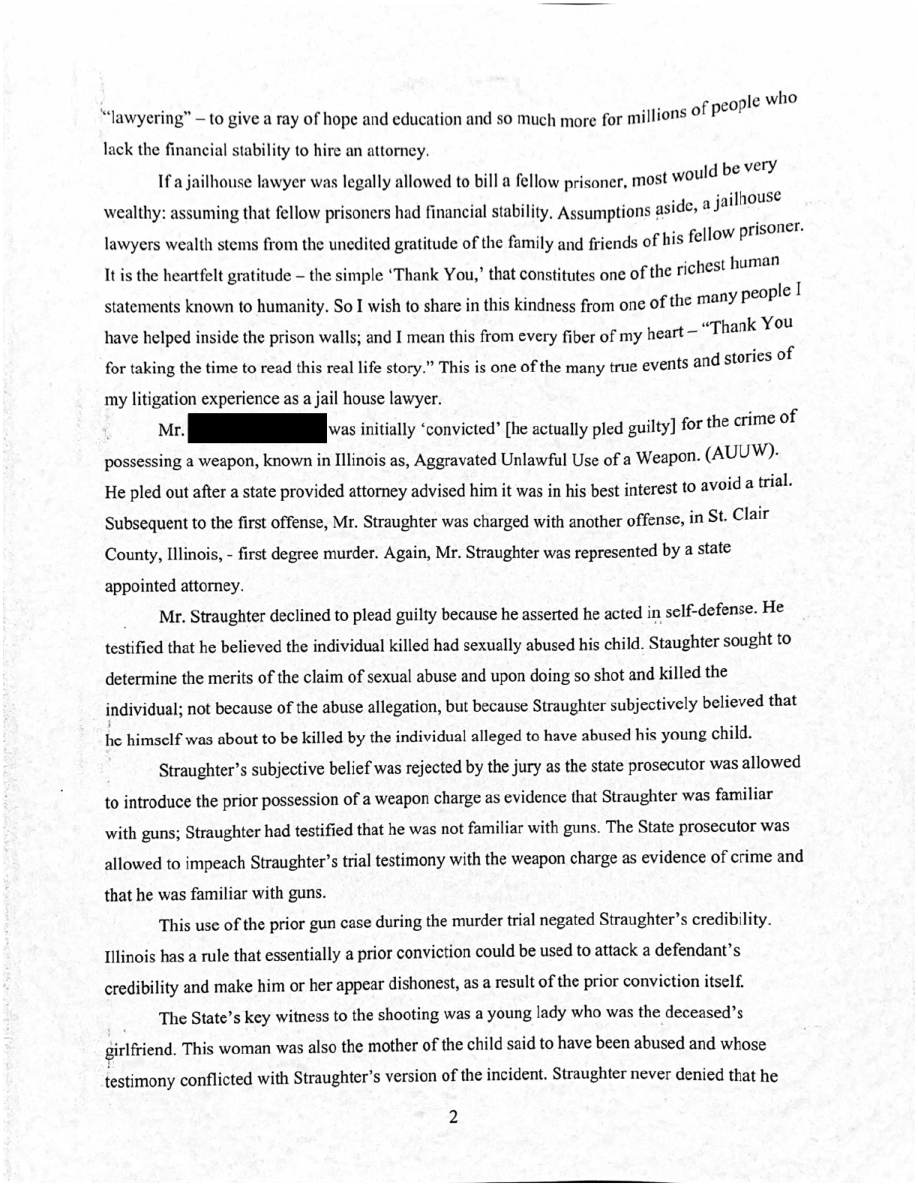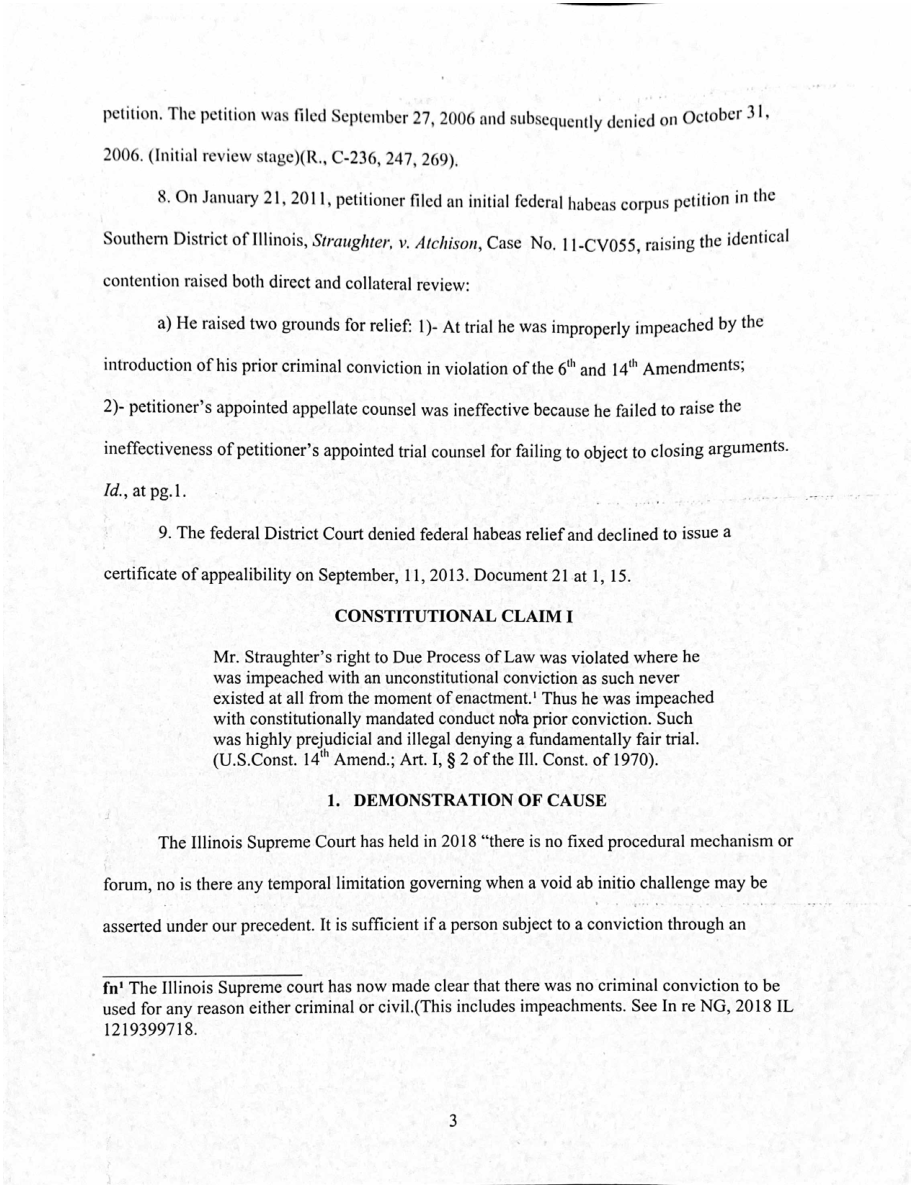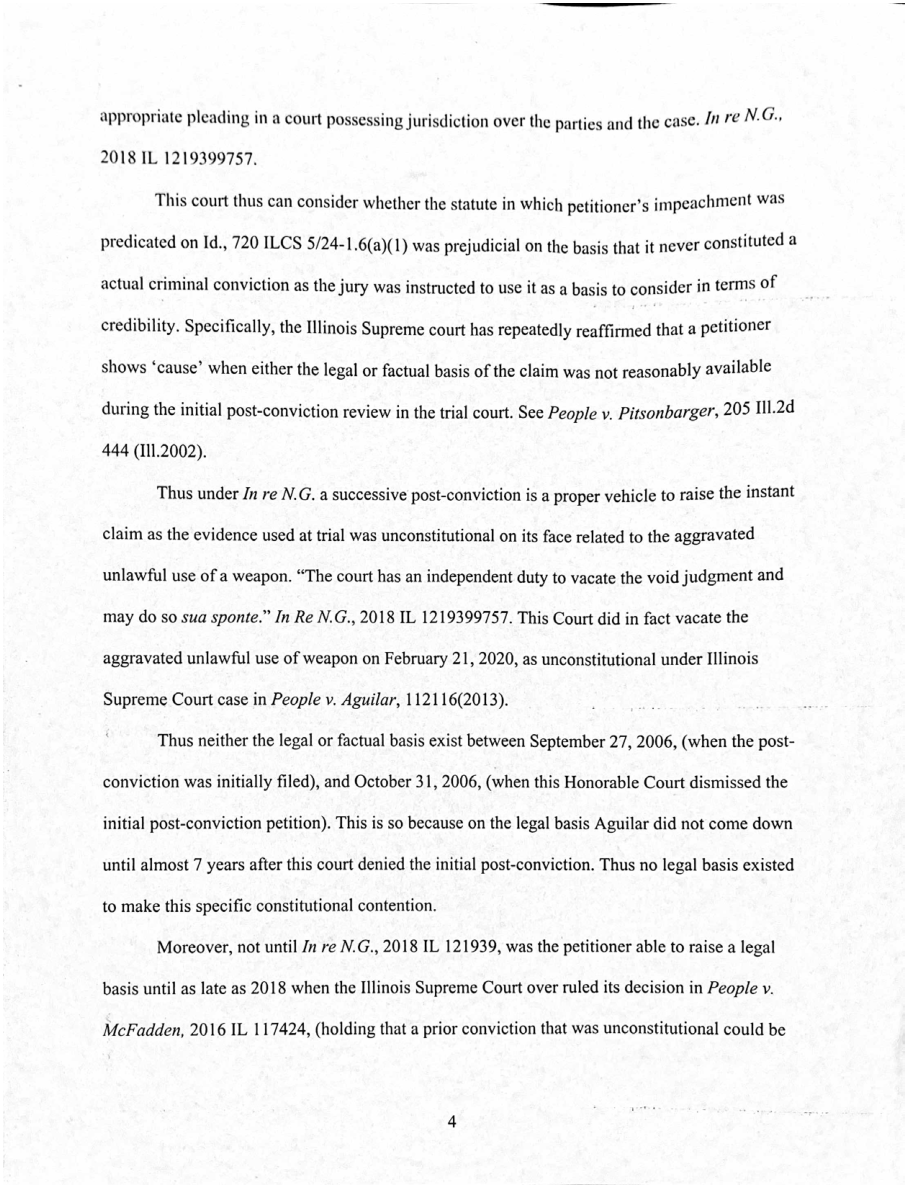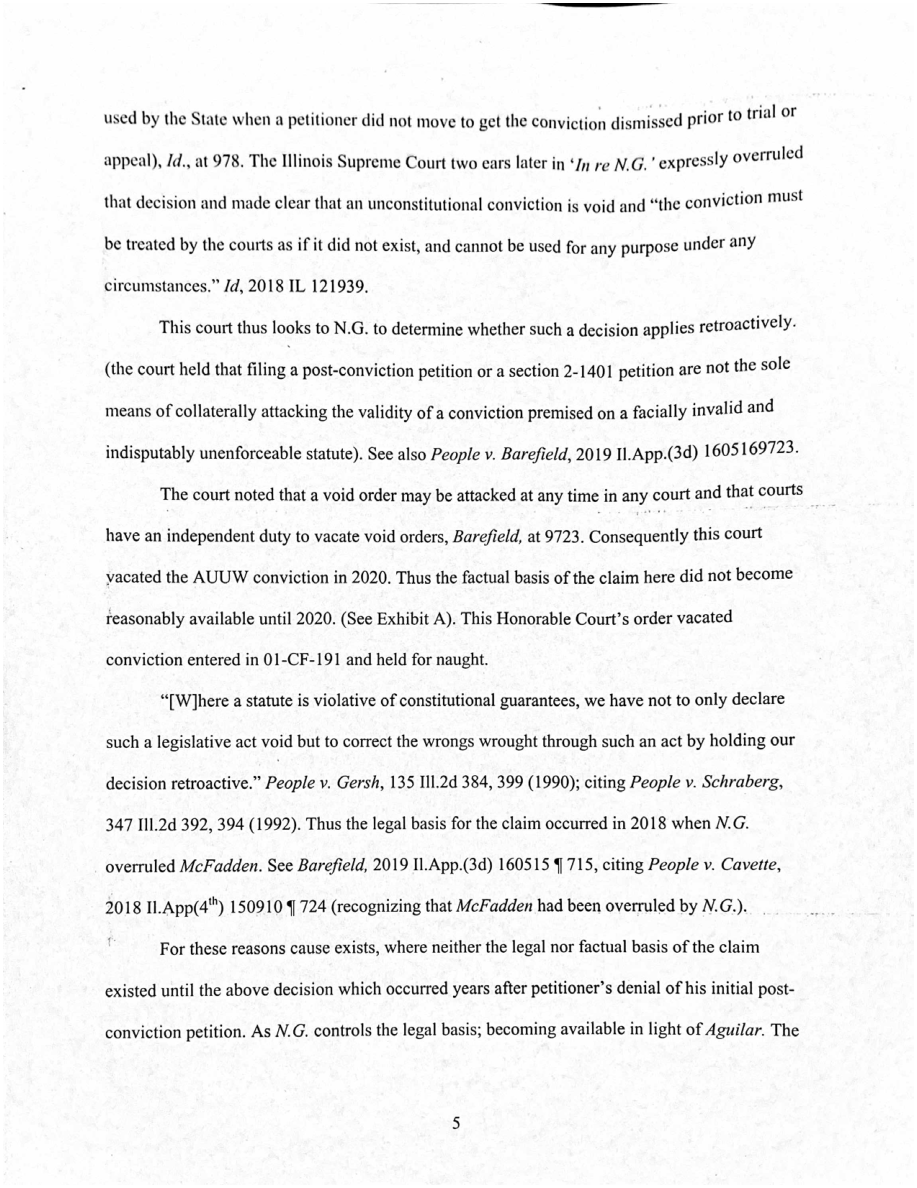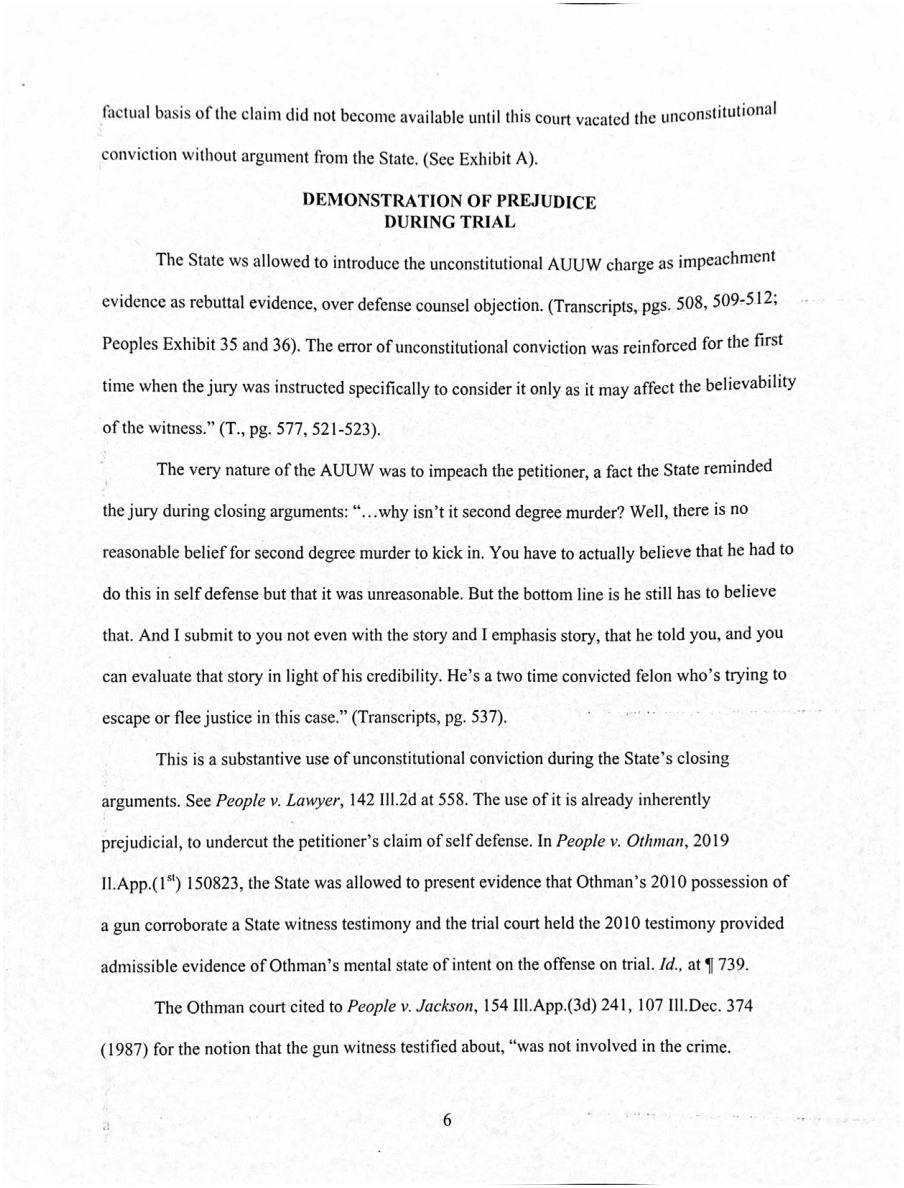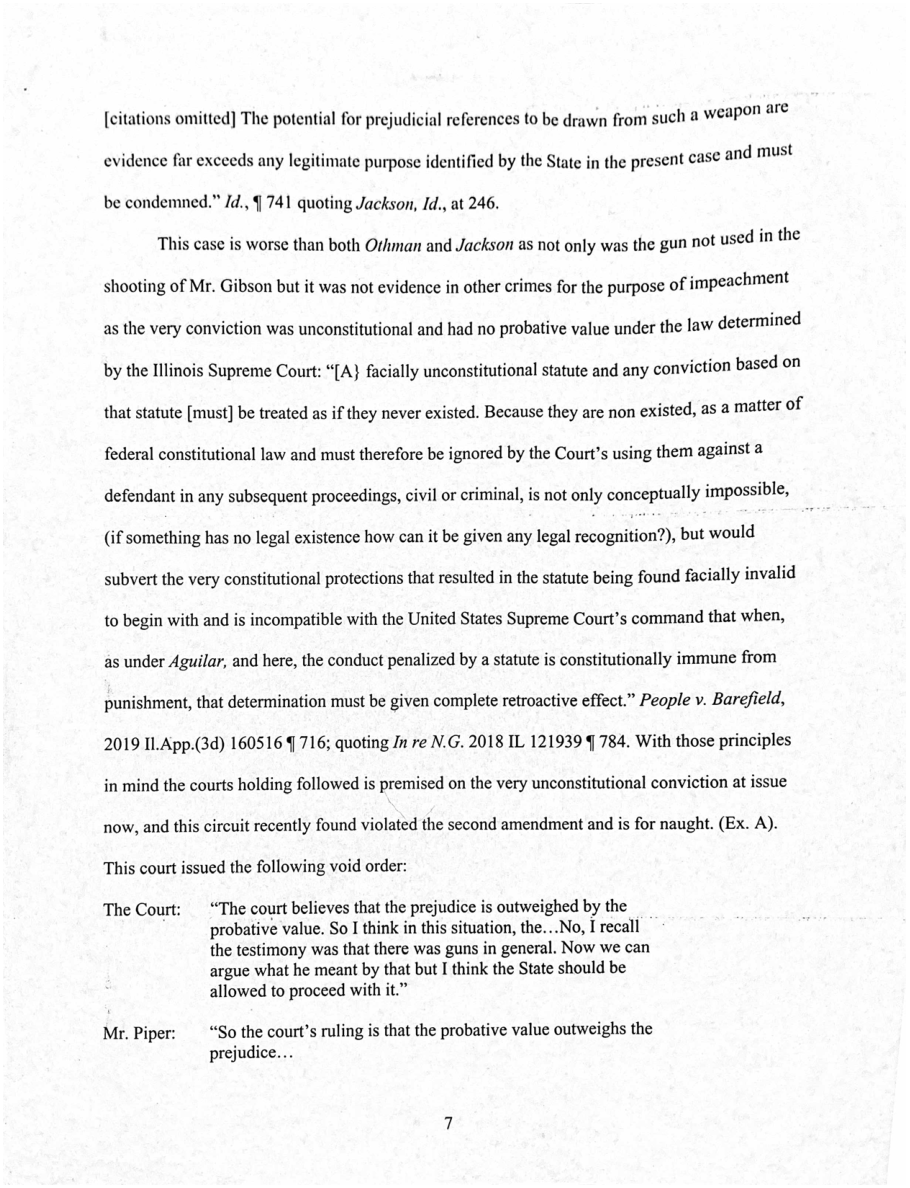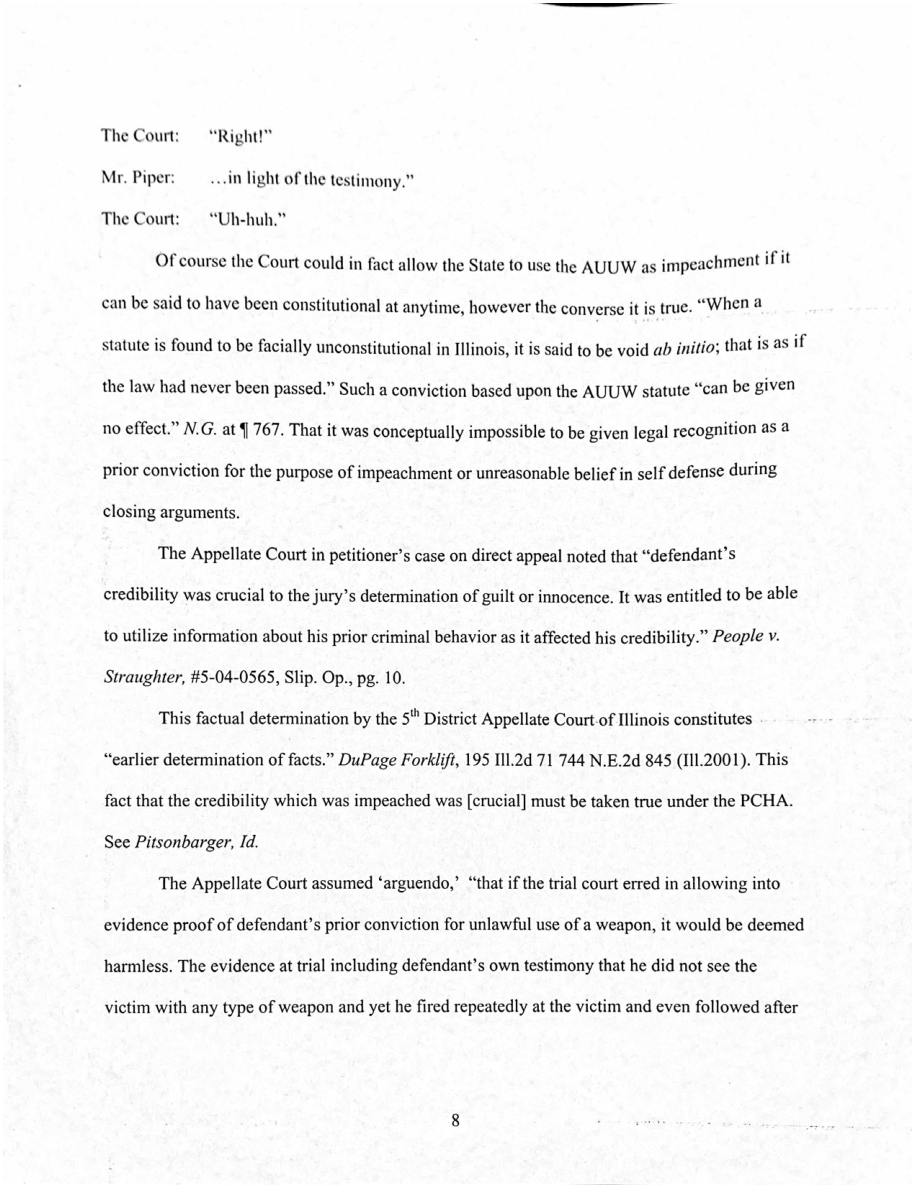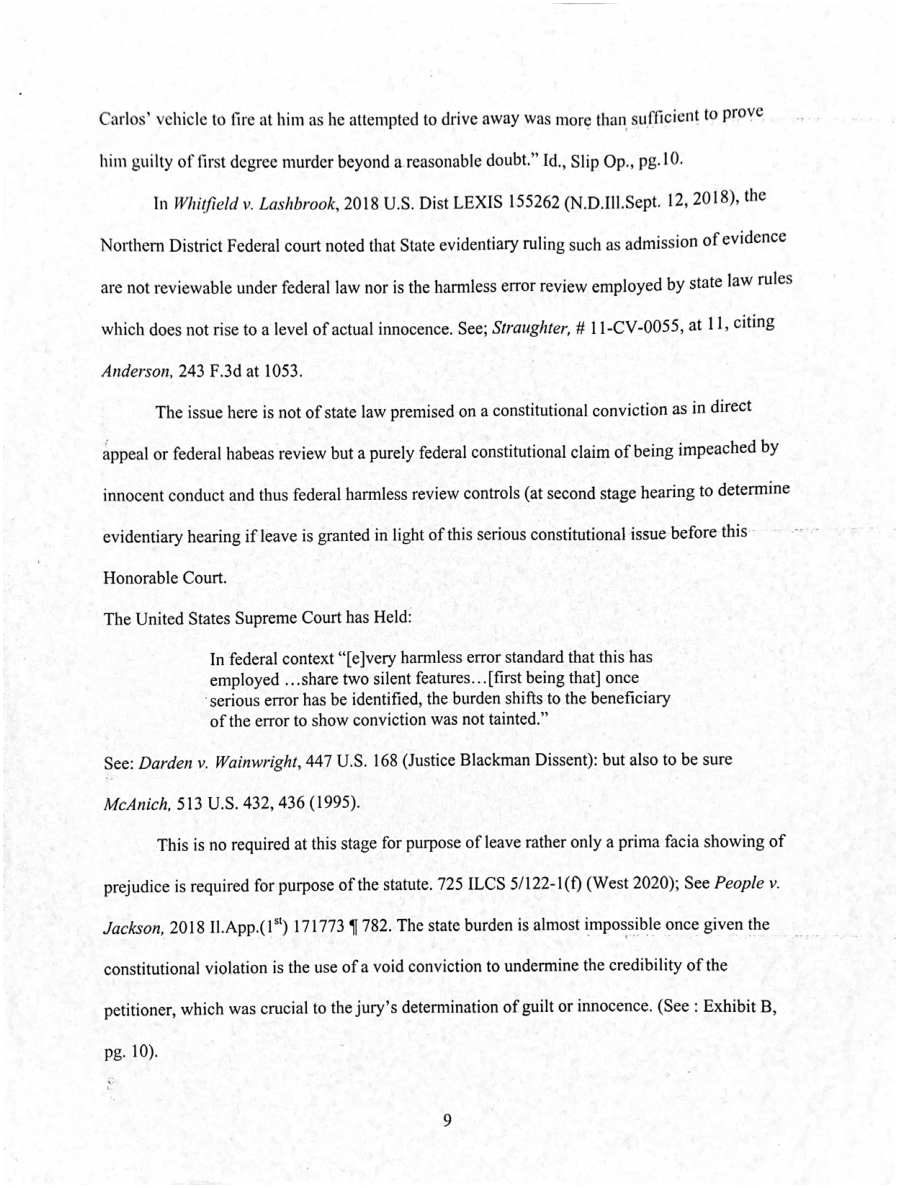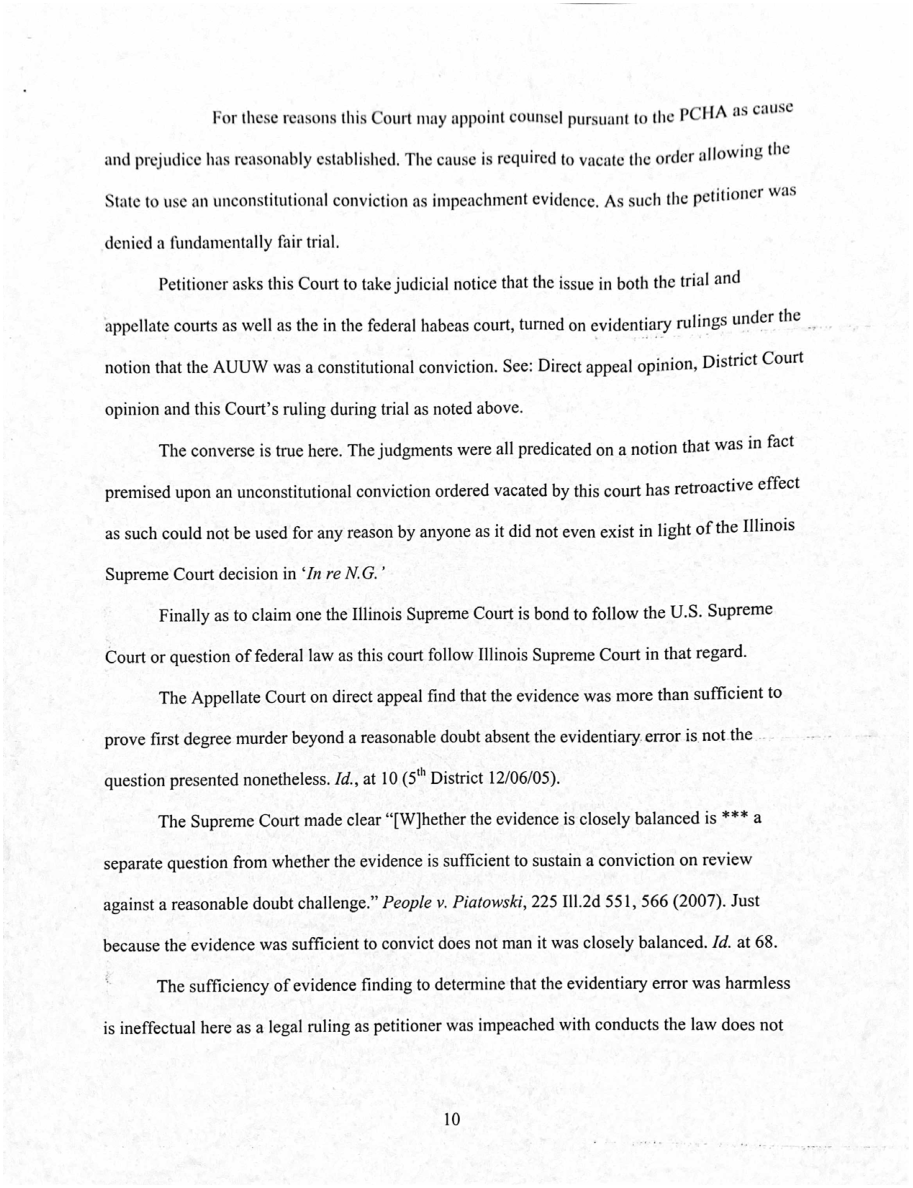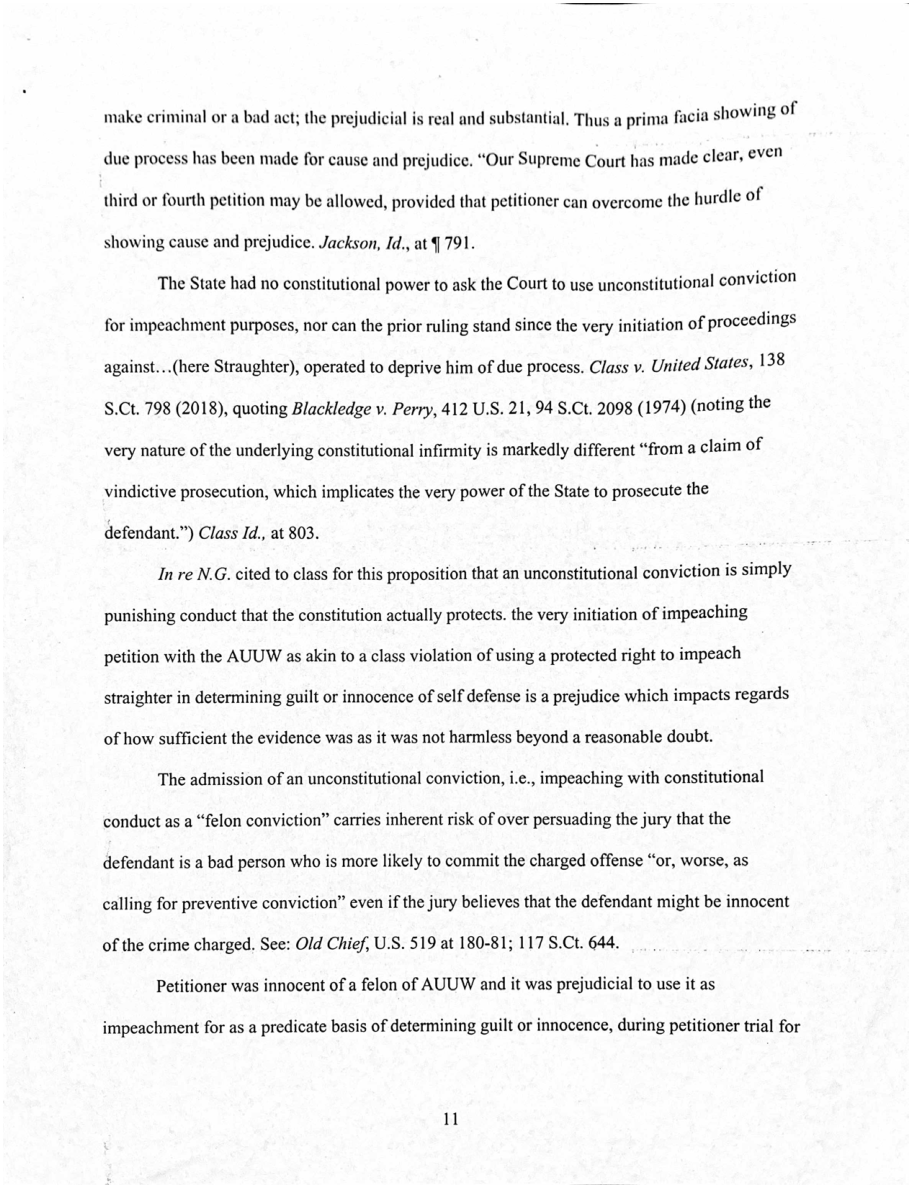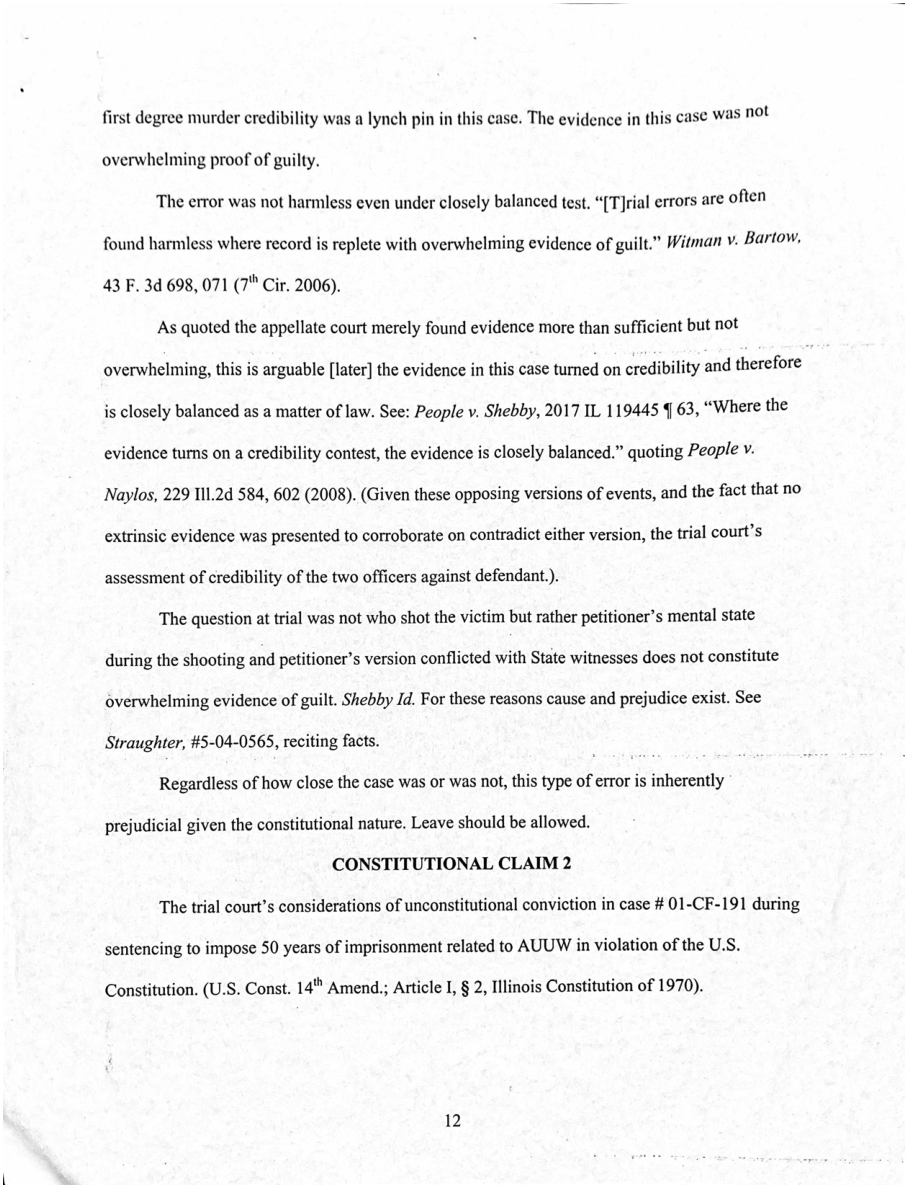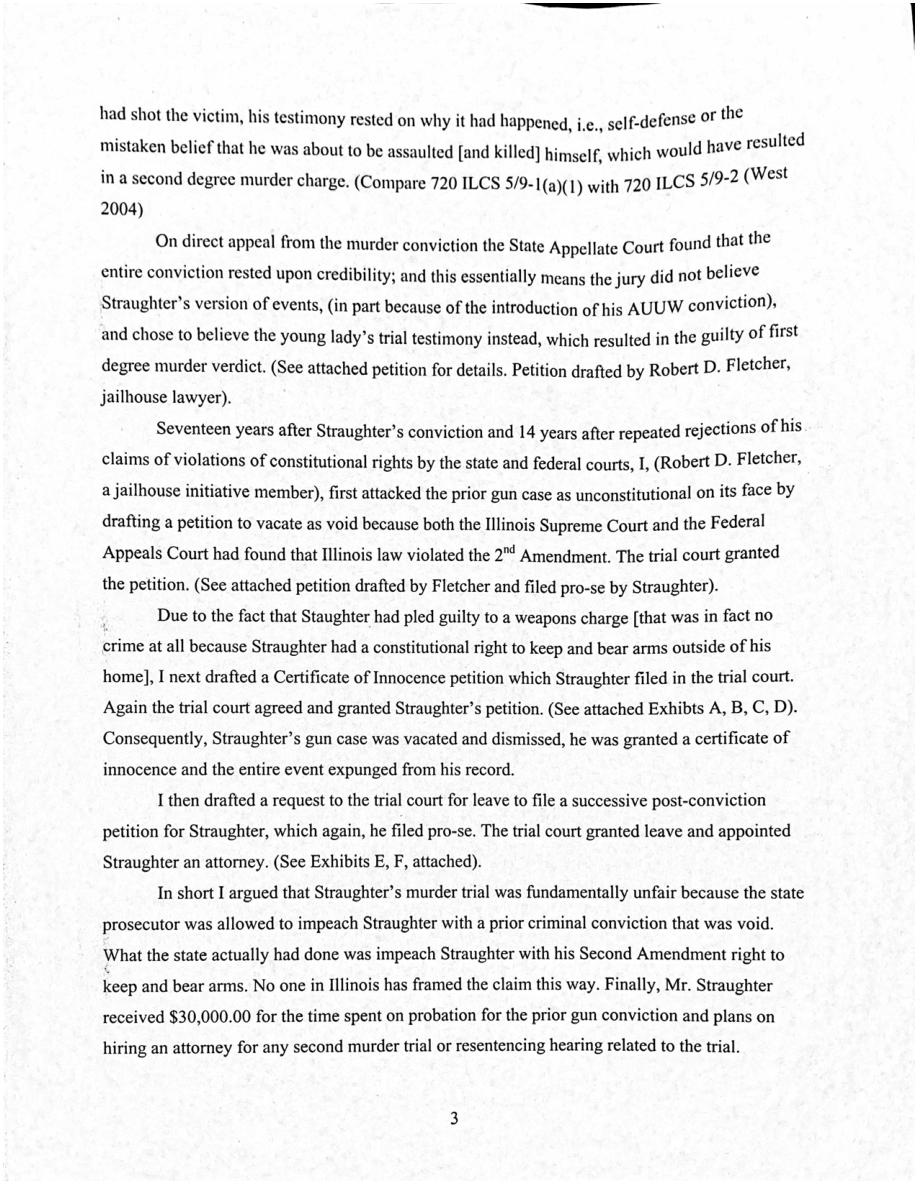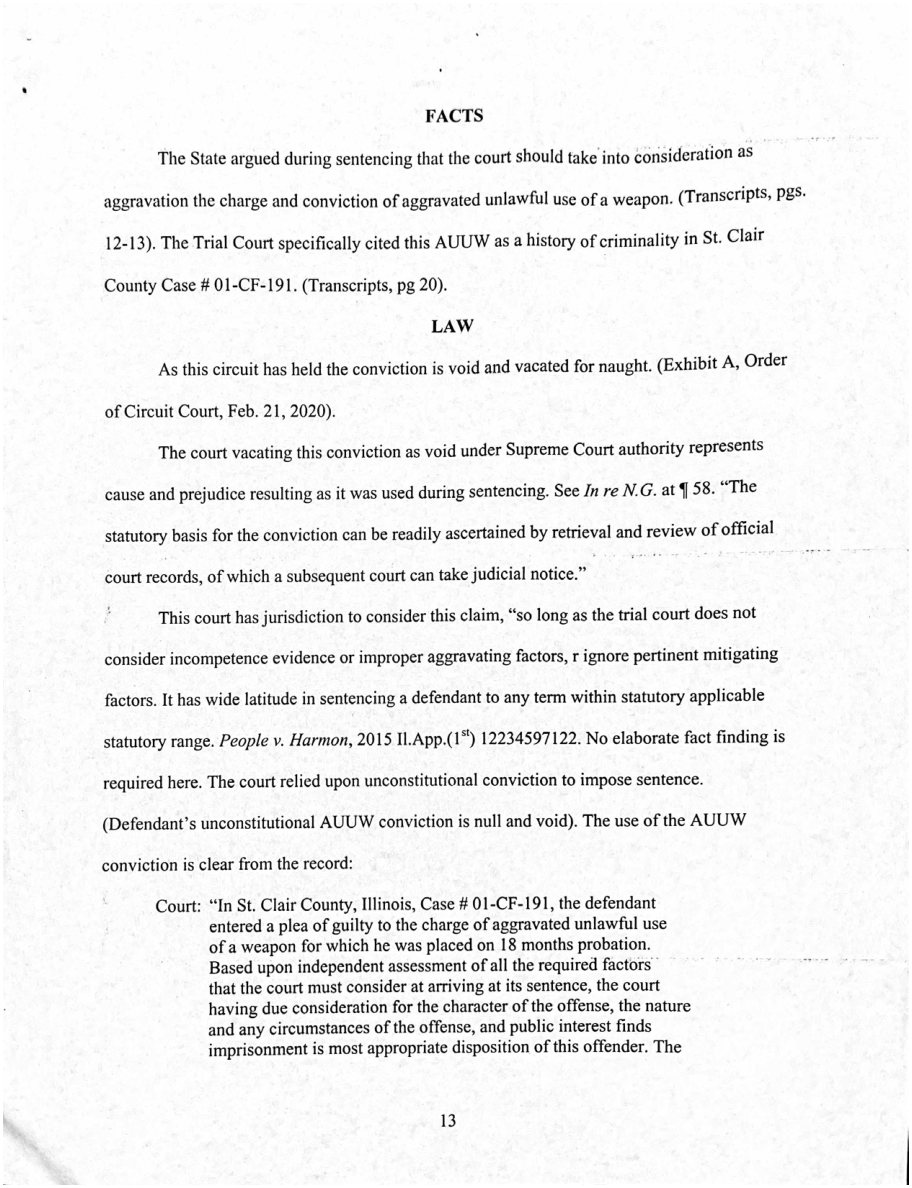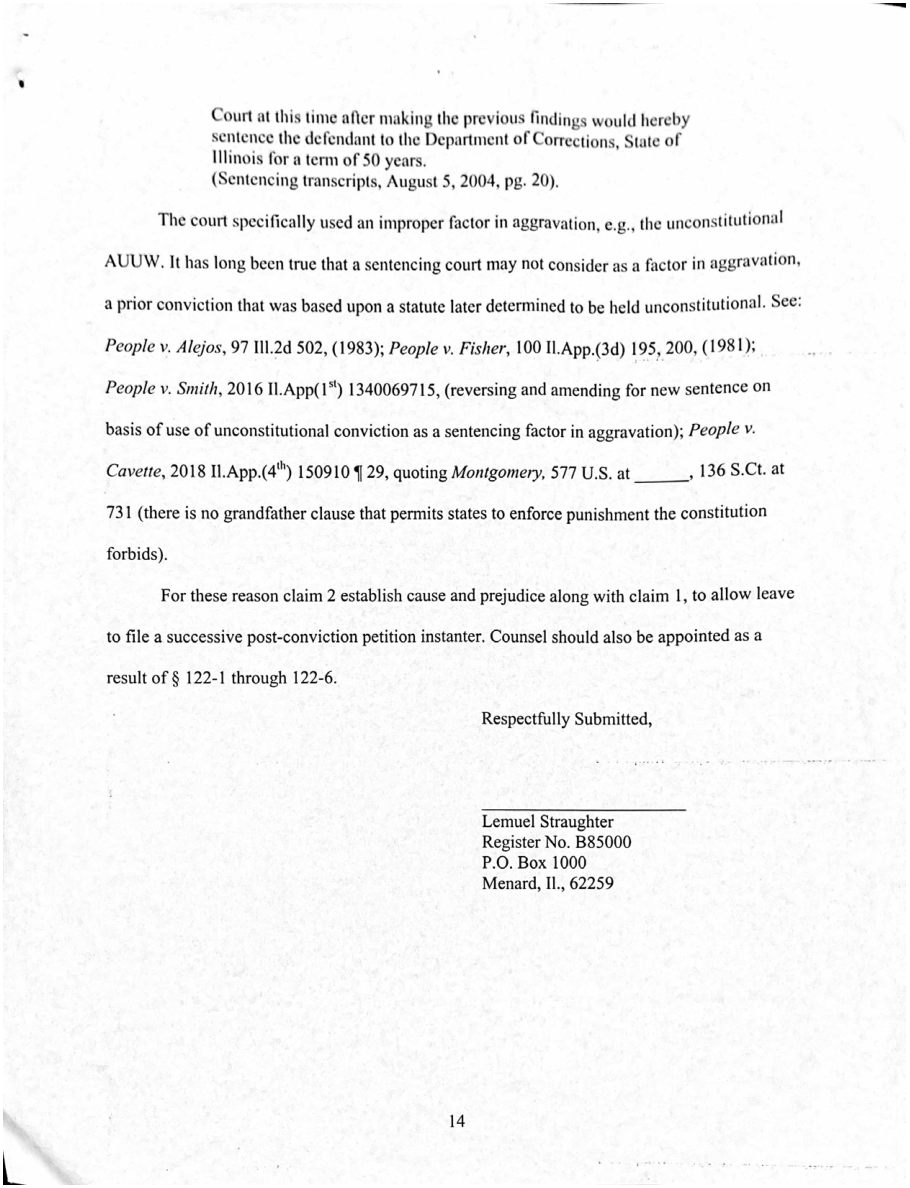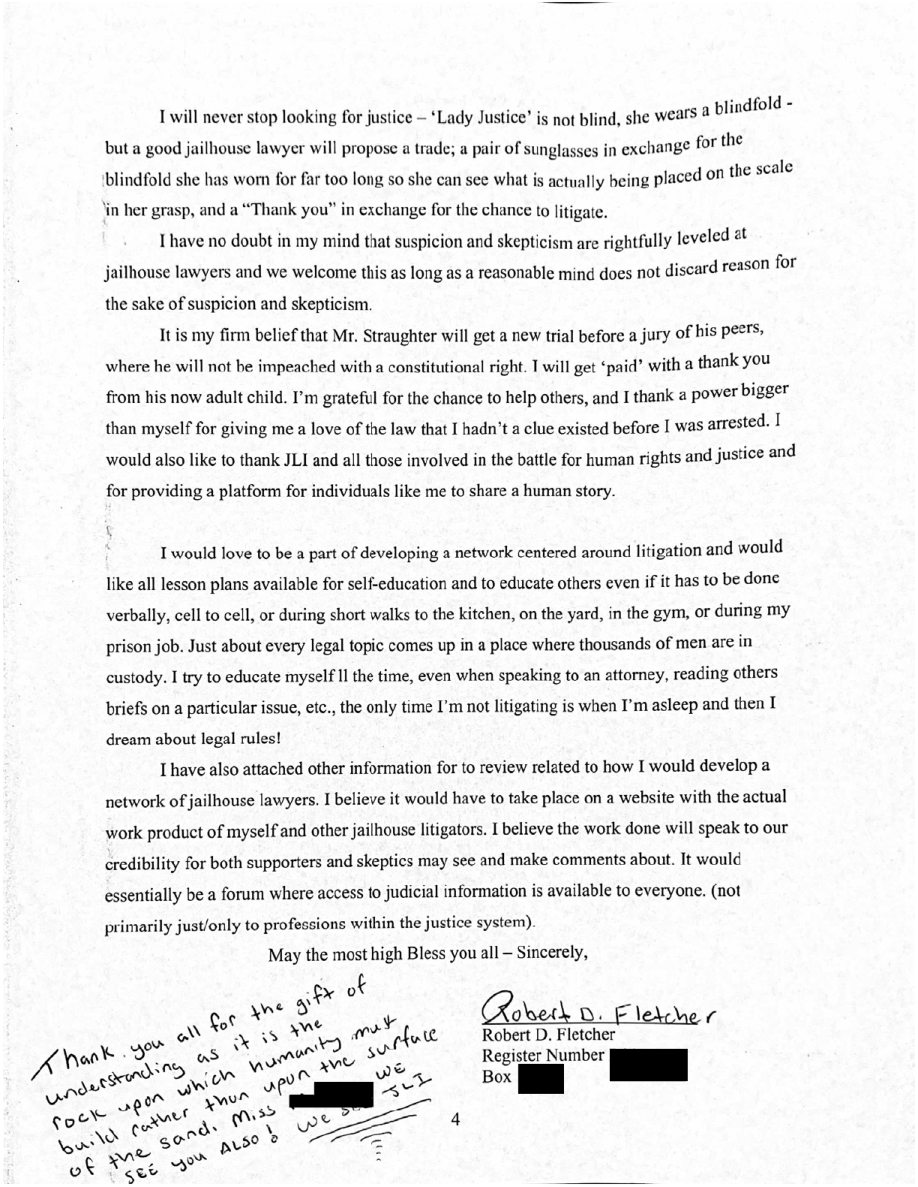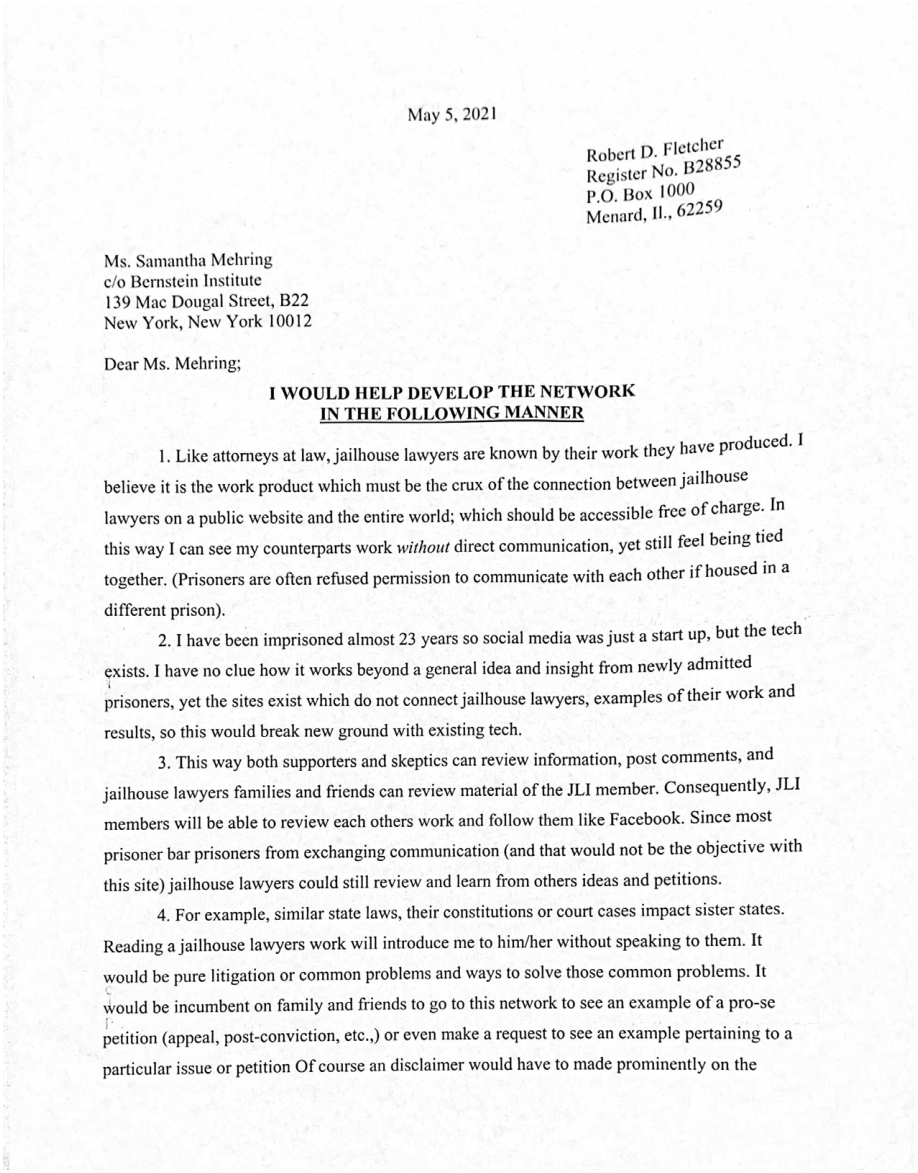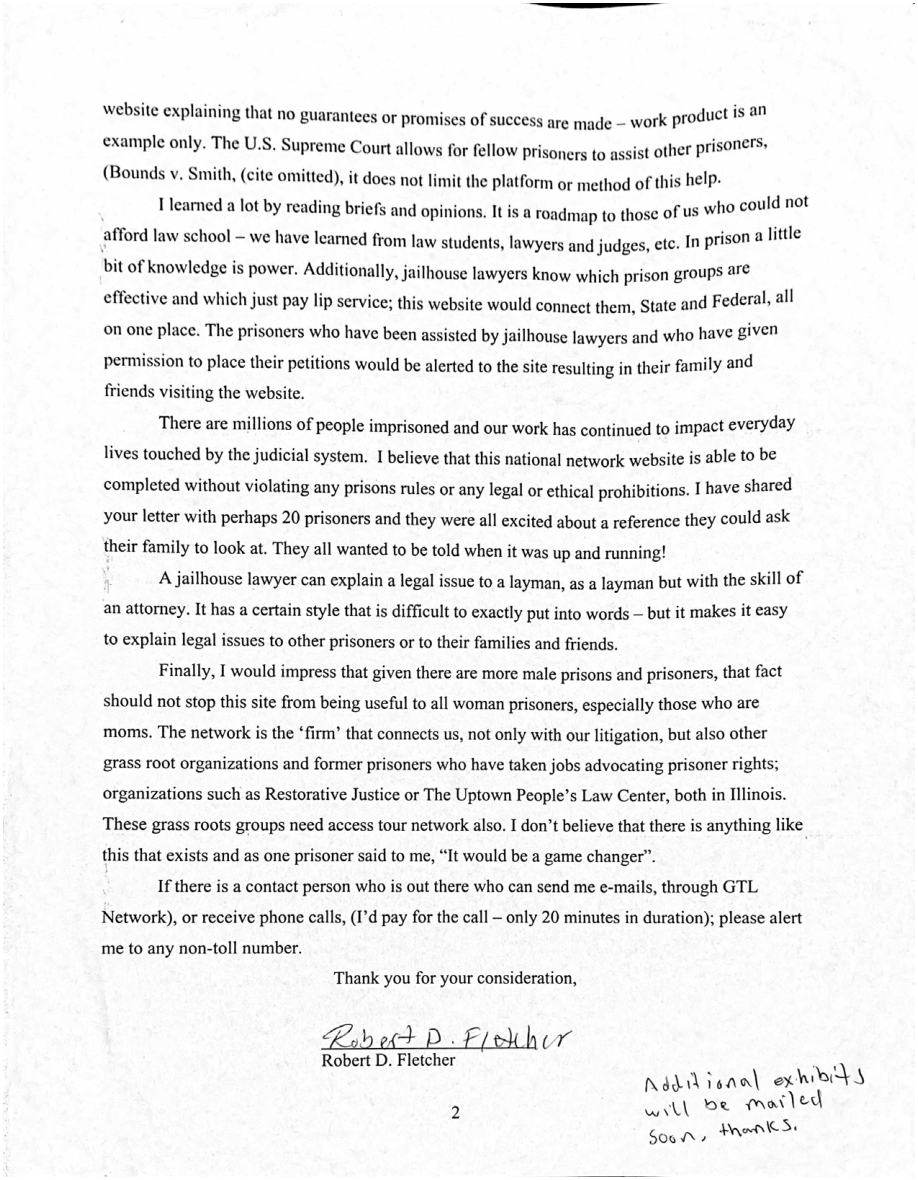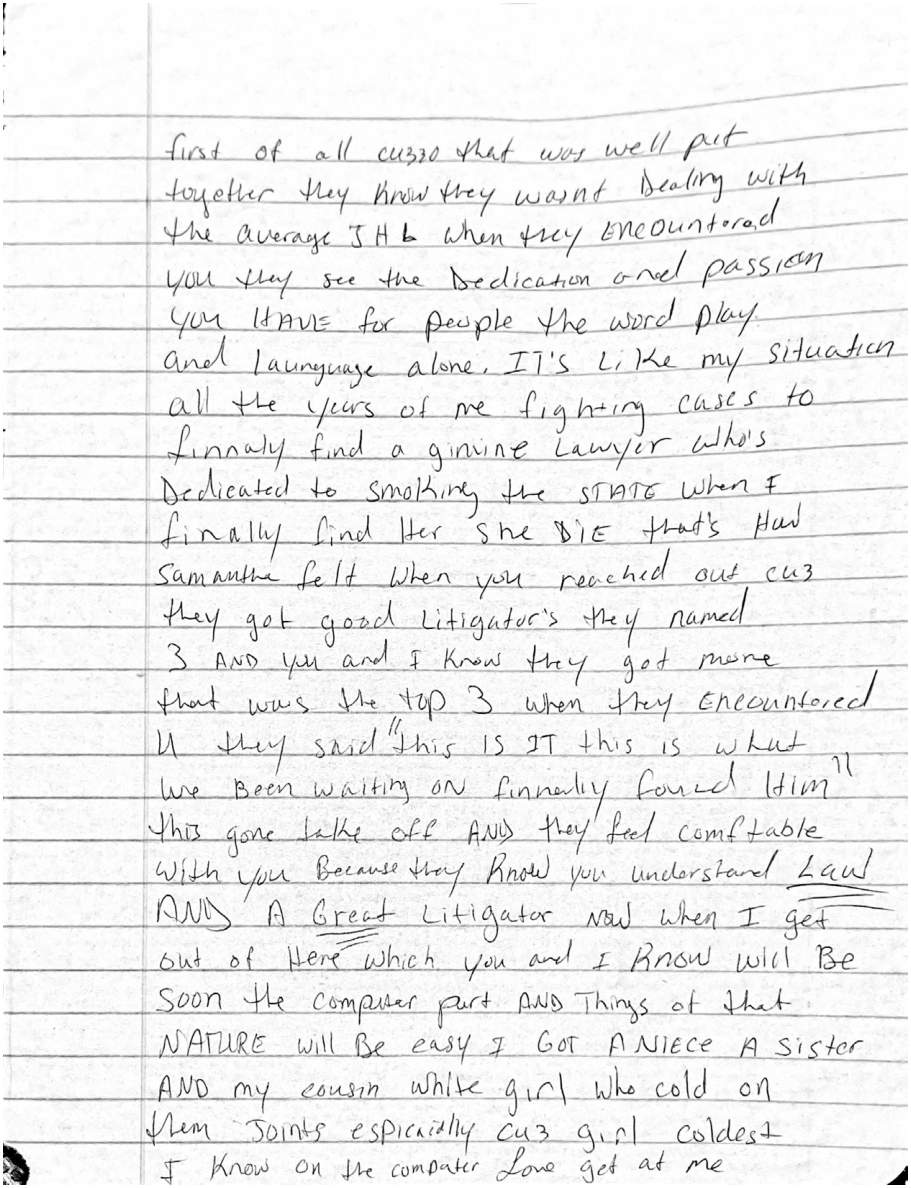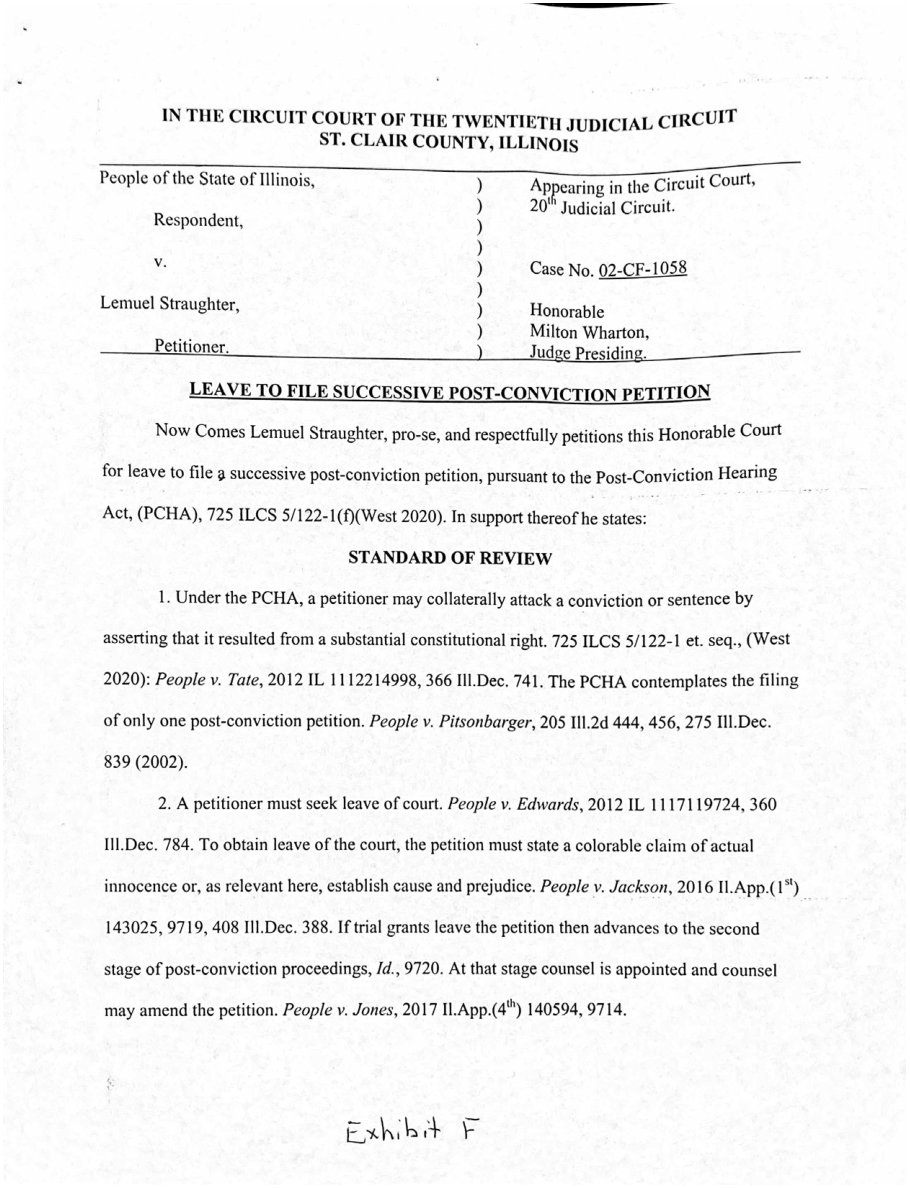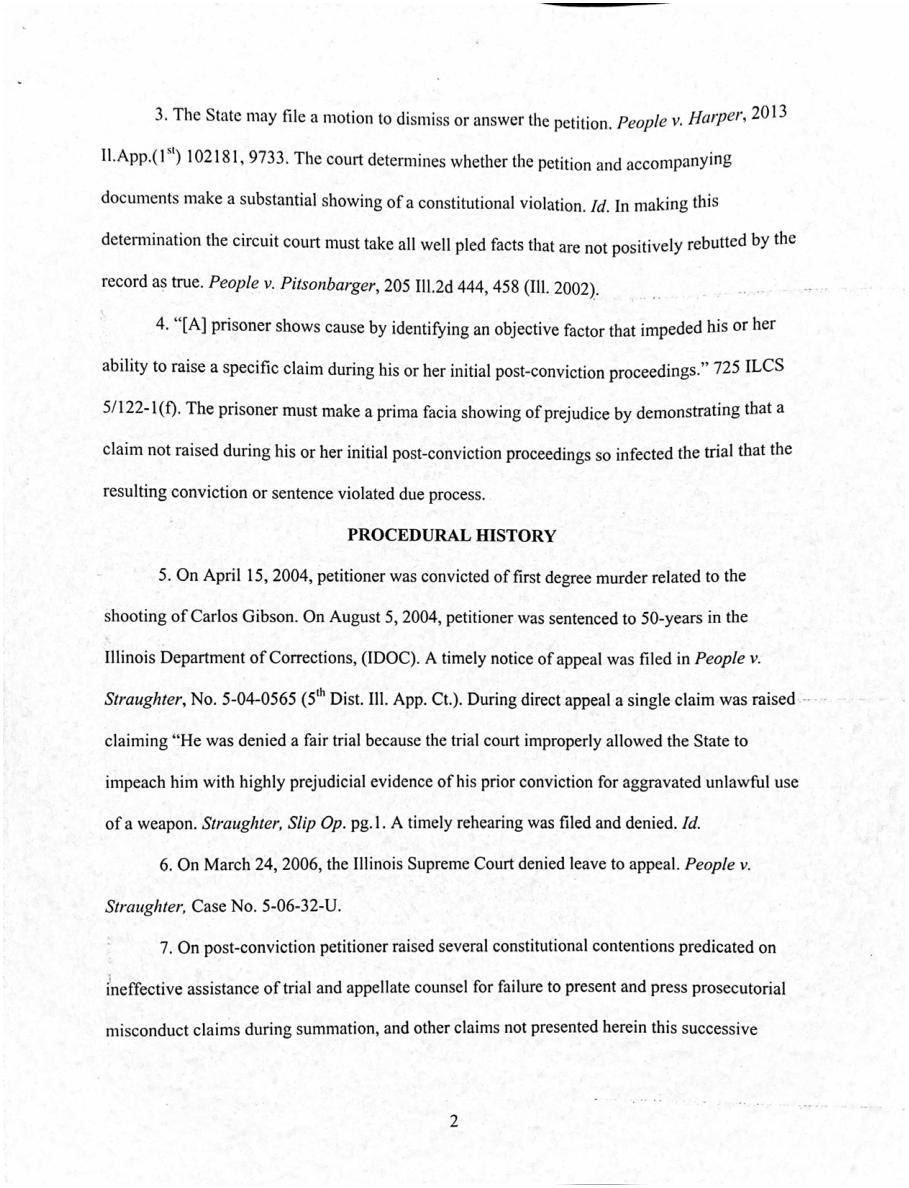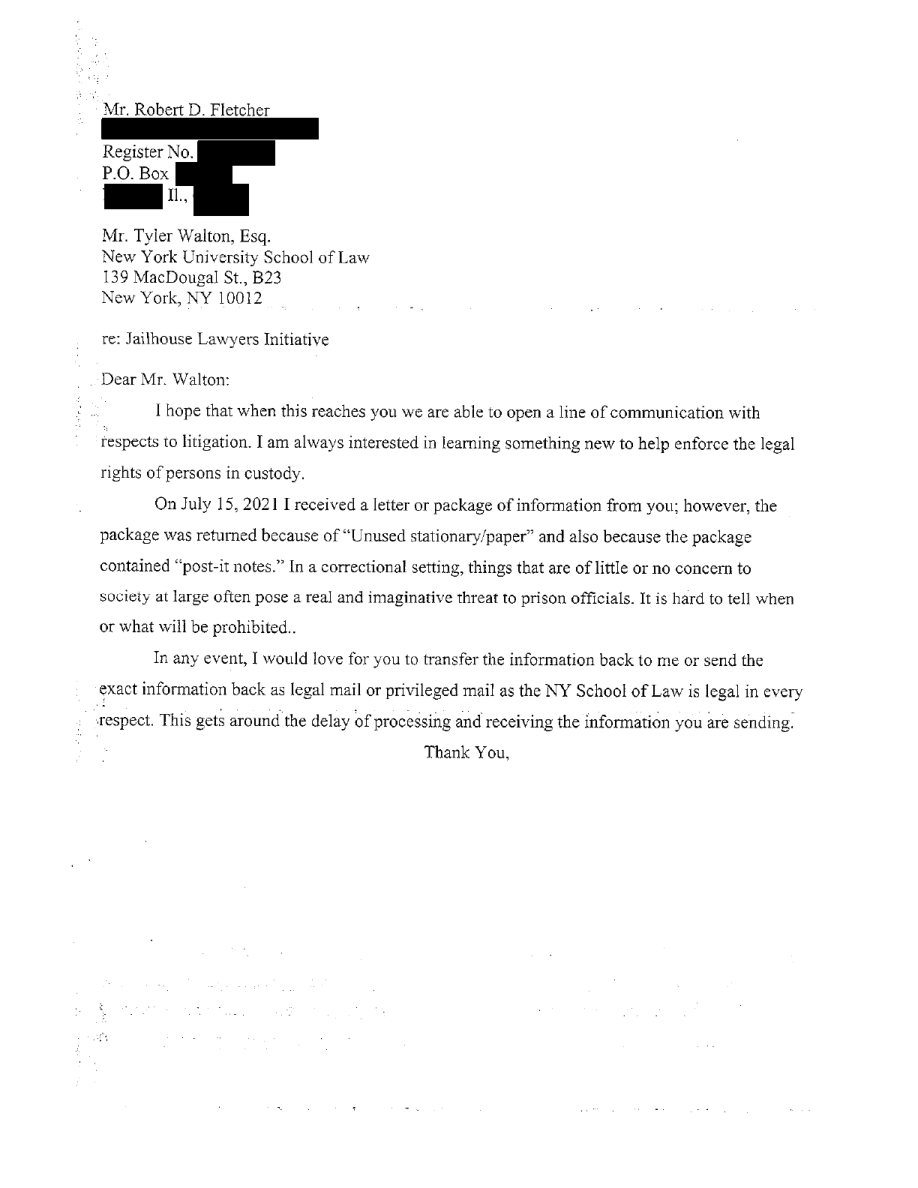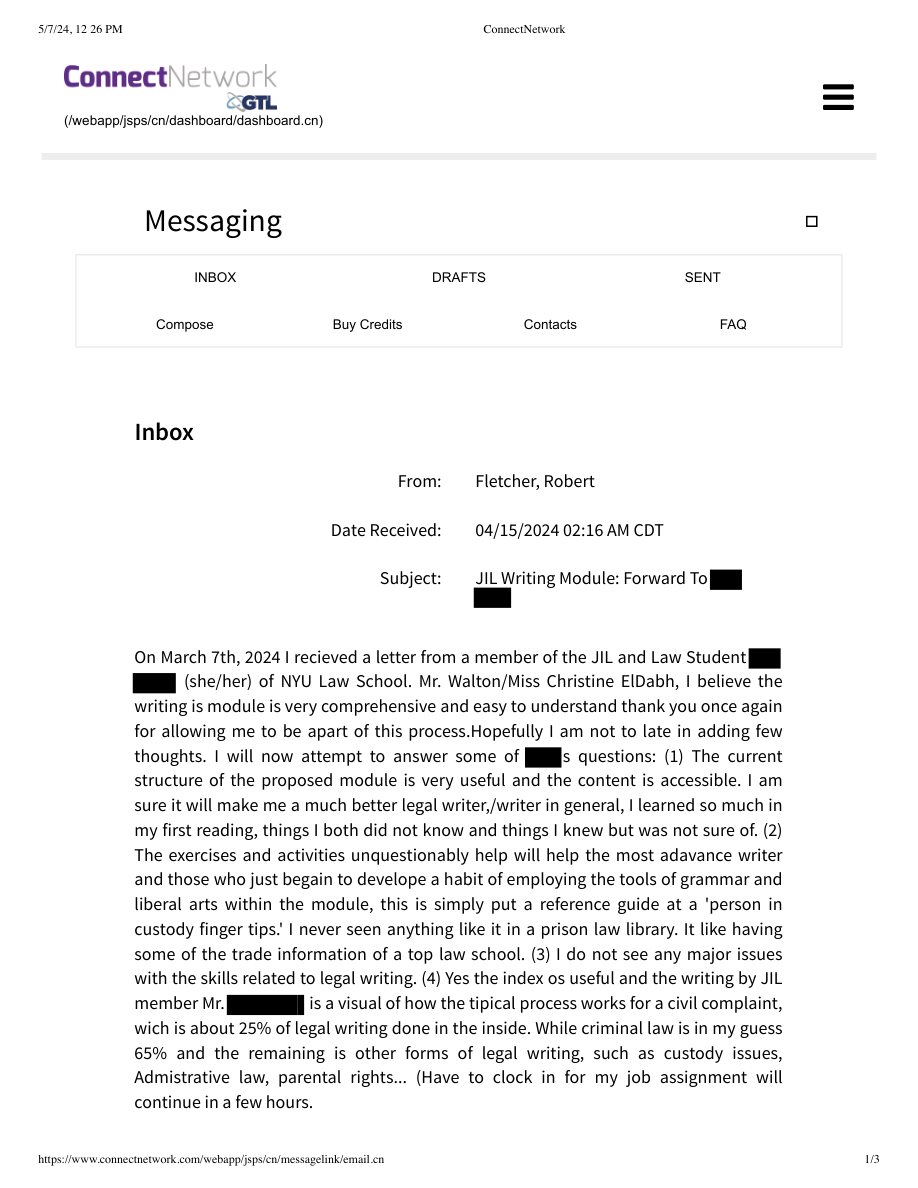Robert D. Fletcher
all letters
Robert D. Fletcher
transcription
Robert D. Fletcher
Register No.[redacted]
P.O. Box [redacted]
[redacted], Il., [redacted]
Jhody D. Polk
c/o The Jailhouse Lawyer Initiative
[redacted]
[redacted]
re: Jailhouse Lawyer Initiative
I want to start by saying that on behalf of the jailhouse lawyers at [redacted] we collectively thank you, and all those involved with this initiative, as we share a keen interest to engage with this forward thinking program.
I'd like to say a little about myself. I am 42-years-old and have been imprisoned for over 20 years for the offense of first degree murder. Since being arrested, throughout my trial, sentence and imprisonment, I have educated myself in the study of law. I have filed numerous petitions, at every level of the judicial system on behalf of myself and, have helped other prisoners draft pleadings in their cases.
My primary discipline is criminal law and recently have had two prior convictions vacated by the trial court. I personally litigated and presented oral arguments; I successfully petitioned for a certificate of innocence after having the convictions vacated, and then filed for damages in a de facto civil court, consequently winning an award of $10,000.00 (USC). I've used that success to aid others to have similar charges vacated and even helped a prisoner get his natural life sentence vacated. He will be released within two weeks. Both prosecutors and defense attorneys are impressed with my work, off the record of course, not knowing that I have drafted a prisoner's legal pleadings.
I have no formal education in the law or with any college experience. My life from birth has been a hardship that cannot be easily transferred into words. My own experience with the legal system has inspired me to help others. I have found that all too often appointed attorneys, with impossible case loads, when left to their own devices, do little actual advocating on behalf of their clients and often make grave procedural errors that are often too late to correct. Many of these errors, if not made, could have reasonably resulted in a different outcome in any given court. In my experience, appointed attorneys often fail to challenge a federal district court's denial of a Certificate of Appealibility. I have filed a number of certificates, in my own case and behalf of others and have been successful in getting the 7th Circuit Court of Appeals to continue review of the claims presented.
Some say that I have a talent for the law because my comprehension level is high in that area. To me is as easy as learning the rules of a system, or the system of rules; then the reality of the law becomes self evident. I was recently assigned to work in the prison law library as a floor clerk I notice flaws in the system and attempt to use the rules to correct the flaws. Since being assigned as a law clerk, (less than a year now), I have drafted for many individual prisoners, at least 30 different pleadings; it is impossible to say how many I've drafted in 20 years working with other prisoners.
Again I thank you, and your initiative, for being involved in this battle for justice on behalf of a force that has, through trial and error, cut through the justice system. In my opinion, true jailhouse lawyers are a body of masterminds and I can't help but wonder whether your initiative is the 'head' to operate our course of action?
A close friend of mine is another jailhouse lawyer whose interest lies in civil law, i.e., §1983 complaints. I will inform him of your organization and ask him to write you also. His impact on the prison system in general is exceptional and he may be able to benefit the initiative.
In closing, if I may suggest, that if somehow your team can build a team of jailhouse lawyers and connect them in a meaningful way around litigation, it would be one of the most powerful 'law firms' that exist. In a normal day most of my fellow clerks do the research and debate topics, have strategic discussions following debates and file pleadings, on our own behalf and most importantly, on behalf of those who don't understand the law, many times from behind bars and in our cages.
Thank You.
Robert D. Fletcher
Robert D. Fletcher
transcription
May 5, 2021
Ms. [redacted]
c/o Bernstein Institute
139 Mac Dougal Street, B22
New York, New York 10012
Robert D. Fletcher
Register No. [redacted]
P.O. Box [redacted]
[redacted], Il., [redacted]
Dear Ms. [redacted];
Thank you for responding to my letter and I humbly accept the invitation to join JLI in forming and developing a national network of currently incarcerated jailhouse lawyers. Although humbled, I would be remiss in failing to tell you how excited I was reading your letter. For such a shared ideal to take root is stunning to any serious person who litigates from an often dark prison cell devoid of natural light.
Initially it was difficult to determine which story to write about given the host of individuals I have had the opportunity to help. These men essentially lean on jailhouse lawyers as the last ray of hope; they are both U.S. citizens and immigrants who fail to comprehend what rights encompass a fair trial. Yet regardless of the lack of comprehension, they fully understood that something went terribly wrong when they were provided an appointed attorney who only peripherally focused on their own legal woes because they had to manage so many other clients. Consequently, these men, (and of course women), know that they received the short end of a broken stick but didn't have any idea what to do about it, if anything at all.
As it often happens, they are sent to an overcrowded prison where they are met with ambiguity to their plight. Many individuals are impacted by these policies, including the taxpayer, supportive of get tough on crime penalties, but often unaware that thousands of these men and women have later been exonerated of committing any crime at all; and all on the taxpayers' dime. These exonerations come after decades of wrongful imprisonment.
For some of these men and women, they start to understand and apply the law to their own cases; as their knowledge grows they begin to extend their understanding to other prisoners who cannot comprehend our nation's laws or various state interpretations, no matter how many years pass in their study of law. This exchange of ideas and understanding gave birth to jailhouse "lawyering" - to give a ray of hope and education and so much more for millions of people who lack the financial stability to hire an attorney.
If a jailhouse lawyer was legally allowed to bill a fellow prisoner, most would be very wealthy: assuming that fellow prisoners had financial stability. Assumptions aside, a jailhouse lawyers wealth stems from the unedited gratitude of the family and friends of his fellow prisoner. It is the heartfelt gratitude - the simple 'Thank You,' that constitutes one of the richest human statements known to humanity. So I wish to share in this kindness from one of the many people I have helped inside the prison walls; and I mean this from every fiber of my heart - "Thank You for taking the time to read this real life story." This is one of the many true events and stories of my litigation experience as a jail house lawyer.
Mr. [redacted] was initially 'convicted' [he actually pled guilty] for the crime of possessing a weapon, known in Illinois as, Aggravated Unlawful Use of a Weapon. (AUUW). He pled out after a state provided attorney advised him it was in his best interest to avoid a trial. Subsequent to the first offense, Mr. [redacted] was charged with another offense, in St. Clair County, Illinois, - first degree murder. Again, Mr. [redacted] was represented by a state appointed attorney.
Mr. [redacted]declined to plead guilty because he asserted he acted in self-defense. He testified that he believed the individual killed had sexually abused his child. [redacted] sought to determine the merits of the claim of sexual abuse and upon doing so shot and killed the individual; not because of the abuse allegation, but because [redacted] subjectively believed that he himself was about to be killed by the individual alleged to have abused his young child.
[redacted]r's subjective belief was rejected by the jury as the state prosecutor was allowed to introduce the prior possession of a weapon charge as evidence that [redacted]was familiar with guns; S[redacted] had testified that he was not familiar with guns. The State prosecutor was allowed to impeach [redacted]'s trial testimony with the weapon charge as evidence of crime and that he was familiar with guns.
This use of the prior gun case during the murder trial negated [redacted]'s credibility. Illinois has a rule that essentially a prior conviction could be used to attack a defendant's credibility and make him or her appear dishonest, as a result of the prior conviction itself.
The State's key witness to the shooting was a young lady who was the deceased's girlfriend. This woman was also the mother of the child said to have been abused and whose testimony conflicted with [redacted]'s version of the incident. [redacted] never denied that he had shot the victim, his testimony rested on why it had happened, i.e., self-defense or the mistaken belief that he was about to be assaulted [and killed] himself, which would have resulted in a second degree murder charge. (Compare 720 ILCS 5/9-1(a)(1) with 720 ILCS 5/9-2 (West 2004)
On direct appeal from the murder conviction the State Appellate Court found that the entire conviction rested upon credibility; and this essentially means the jury did not believe [redacted]'s version of events, (in part because of the introduction of his AUUW conviction), and chose to believe the young lady's trial testimony instead, which resulted in the guilty of first degree murder verdict. (See attached petition for details. Petition drafted by Robert D. Fletcher, jailhouse lawyer).
Seventeen years after [redacted]r's conviction and 14 years after repeated rejections of his claims of violations of constitutional rights by the state and federal courts, I, (Robert D. Fletcher, a jailhouse initiative member), first attacked the prior gun case as unconstitutional on its face by drafting a petition to vacate as void because both the Illinois Supreme Court and the Federal Appeals Court had found that Illinois law violated the 2nd Amendment. The trial court granted the petition. (See attached petition drafted by Fletcher and filed pro-se by [redacted]).
Due to the fact that [redacted] had pled guilty to a weapons charge [that was in fact no crime at all because [redacted] had a constitutional right to keep and bear arms outside of his home], I next drafted a Certificate of Innocence petition which [redacted]filed in the trial court. Again the trial court agreed and granted [redacted];s petition. (See attached Exhibts A, B, C, D). Consequently, [redacted]'s gun case was vacated and dismissed, he was granted a certificate of innocence and the entire event expunged from his record.
I then drafted a request to the trial court for leave to file a successive post-conviction petition for[redacted], which again, he filed pro-se. The trial court granted leave and appointed [redacted] an attorney. (See Exhibits E, F, attached).
In short I argued that[redacted]s murder trial was fundamentally unfair because the state prosecutor was allowed to impeach [redacted]with a prior criminal conviction that was void. What the state actually had done was impeach [redacted] with his Second Amendment right to keep and bear arms. No one in Illinois has framed the claim this way. Finally, Mr. [redacted] received $30,000.00 for the time spent on probation for the prior gun conviction and plans on hiring an attorney for any second murder trial or resentencing hearing related to the trial.
I will never stop looking for justice - "Lady Justice' is not blind, she wears a blindfold - but a good jailhouse lawyer will propose a trade; a pair of sunglasses in exchange for the blindfold she has worn for far too long so she can see what is actually being placed on the scale in her grasp, and a "Thank you" in exchange for the chance to litigate.
I have no doubt in my mind that suspicion and skepticism are rightfully leveled at jailhouse lawyers and we welcome this as long as a reasonable mind does not discard reason for the sake of suspicion and skepticism.
It is my firm belief that Mr. [redacted] will get a new trial before a jury of his peers, where he will not be impeached with a constitutional right. I will get 'paid' with a thank you from his now adult child. I'm grateful for the chance to help others, and I thank a power bigger than myself for giving me a love of the law that I hadn't a clue existed before I was arrested. I would also like to thank JLI and all those involved in the battle for human rights and justice and for providing a platform for individuals like me to share a human story.
I would love to be a part of developing a network centered around litigation and would like all lesson plans available for self-education and to educate others even if it has to be done verbally, cell to cell, or during short walks to the kitchen, on the yard, in the gym, or during my prison job. Just about every legal topic comes up in a place where thousands of men are in custody. I try to educate myself Il the time, even when speaking to an attorney, reading others briefs on a particular issue, etc., the only time I'm not litigating is when I'm asleep and then I dream about legal rules!
I have also attached other information for to review related to how I would develop a network of jailhouse lawyers. I believe it would have to take place on a website with the actual work product of myself and other jailhouse litigators. I believe the work done will speak to our credibility for both supporters and skeptics may see and make comments about. It would essentially be a forum where access to judicial information is available to everyone. (not primarily just/only to professions within the justice system).
May the most high Bless you all - Sincerely,
Thank you all for the gift of understanding as it is the JLI rock upon which humanity must build rather than upon the surface of the sand. Miss [redacted] WE SEE you Also ! we see JLI.
Robert D. Fletcher
Robert D. Fletcher
Register Number [redacted]
Box [redacted]
[redacted], Il., [redacted]
May 5, 2021
Ms. [redacted]
c/o Bernstein Institute
139 Mac Dougal Street, B22
New York, New York 10012
Robert D. Fletcher
Register No. [redacted]
P.O. Box [redacted]
[redacted] Il.,[redacted]
Dear Ms. [redacted];
I WOULD HELP DEVELOP THE NETWORK
IN THE FOLLOWING MANNER
1. Like attorneys at law, jailhouse lawyers are known by their work they have produced. I believe it is the work product which must be the crux of the connection between jailhouse lawyers on a public website and the entire world; which should be accessible free of charge. In this way I can see my counterparts work without direct communication, yet still feel being tied together. (Prisoners are often refused permission to communicate with each other if housed in a different prison).
2. I have been imprisoned almost 23 years so social media was just a start up, but the tech exists. I have no clue how it works beyond a general idea and insight from newly admitted prisoners, yet the sites exist which do not connect jailhouse lawyers, examples of their work and results, so this would break new ground with existing tech.
3. This way both supporters and skeptics can review information, post comments, and jailhouse lawyers families and friends can review material of the JLI member. Consequently, JLI members will be able to review each others work and follow them like Facebook. Since most prisoner bar prisoners from exchanging communication (and that would not be the objective with this site) jailhouse lawyers could still review and learn from others ideas and petitions.
4. For example, similar state laws, their constitutions or court cases impact sister states. Reading a jailhouse lawyers work will introduce me to him/her without speaking to them. It would be pure litigation or common problems and ways to solve those common problems. It would be incumbent on family and friends to go to this network to see an example of a pro-se petition (appeal, post-conviction, etc.,) or even make a request to see an example pertaining to a particular issue or petition Of course an disclaimer would have to made prominently on the website explaining that no guarantees or promises of success are made - work product is an example only. The U.S. Supreme Court allows for fellow prisoners to assist other prisoners, (Bounds v. Smith, (cite omitted), it does not limit the platform or method of this help.
I learned a lot by reading briefs and opinions. It is a roadmap to those of us who could not afford law
school - we have learned from law students, lawyers and judges, etc. In prison a little bit of knowledge is power. Additionally, jailhouse lawyers know which prison groups are effective and which just pay lip service; this website would connect them, State and Federal, all on one place. The prisoners who have been assisted by jailhouse lawyers and who have given permission to place their petitions would be alerted to the site resulting in their family and friends visiting the website.
There are millions of people imprisoned and our work has continued to impact everyday lives touched by the judicial system. I believe that this national network website is able to be completed without violating any prisons rules or any legal or ethical prohibitions. I have shared your letter with perhaps 20 prisoners and they were all excited about a reference they could ask their family to look at. They all wanted to be told when it was up and running!
A jailhouse lawyer can explain a legal issue to a layman, as a layman but with the skill of an attorney. It has a certain style that is difficult to exactly put into words - but it makes it easy to explain legal issues to other prisoners or to their families and friends.
Finally, I would impress that given there are more male prisons and prisoners, that fact should not stop this site from being useful to all woman prisoners, especially those who are moms. The network is the 'firm' that connects us, not only with our litigation, but also other grass root organizations and former prisoners who have taken jobs advocating prisoner rights; organizations such as Restorative Justice or The Uptown People's Law Center, both in Illinois. These grass roots groups need access tour network also. I don't believe that there is anything like this that exists and as one prisoner said to me, "It would be a game changer".
If there is a contact person who is out there who can send me e-mails, through GTL Network), or receive phone calls, (I'd pay for the call - only 20 minutes in duration); please alert me to any non-toll number.
Thank you for your consideration,
Robert D. Fletcher
Robert D. Fletcher
Additional exhibits will be mailed soon, thanks.
LEAVE TO FILE SUCCESSIVE POST-CONVICTION PETITION
Now Comes pro-se, and respectfully petitions this Honorable Court
for leave to file successive post-conviction petition, pursuant to the Post-Conviction Hearing Act, (PCHA), 725 ILCS 5/122-l(f)(West 2020). In support thereof be states:
STANDARD OF REVIEW
1. Under the PCHA, a petitioner may collaterally attack a c nviction or sentence by asserting that it resulted from a substantial constitutional right. 725 ILCS 5/122-1 et. seq., (West 2020): People v. Tate, 2012 IL l 112214998, 366 III.Dec. 741. The PCHA contemplates the filing of only one post-conviction petition. People v. Pitsonbarger, 205 Ill.2d 444, 456, 275 Ill.Dec. 839 (2002).
2. A petitioner must seek leave of court. People v. Edwards, 2012 IL l 117119724, 360 Ill.Dec. 784. To obtain leave of the court, the petition must state a colorable claim of actual innocence or, as relevant here, establish cause and prejudice. People v. Jacks?n, 2016 Il.App.(151) .. 143025, 9719, 408 Ill.Dec. 388. If trial grants leave the petition then advances to the second
stage of post-conviction proceedings, Id., 9720. At that stage counsel is appointed and counsel may amend the petition. People v. Jones, 2017 ll.App.(4th) 140594, 9714.
3. The State may file a motion to dismiss or answer the petition. People v. Harper, 2013 s1
Il.App.(! ) 102181, 9733. The court determines whether the petition and accompanying
documents make a ubstantial showing of a constitutional violation. Id. In making this determination the circuit court must take all well pled facts u1at are not positively rebutted by the record as true. People v. Pitsonbarger, 205 Ill.2d 444, 458 (Ill 2002).
4. "[A] prisoner shows cause by identifying an objective factor that impeded hjs or her ability to raise a specific claim during his vr her initial posH;o11viction proceedings." 725 ILCS 5/122-l(f). The prisoner must make a prima facia showing of prejudice by demonstrating that a claim not raised during his or her initial post-conviction proceedings so infected the trial that the resulting conviction or sentence violated due process.
PROCEDURAL IDSTORY
5. On April 15, 2004, petitioner was convicted of first degree murder related to the shooting o On August 5, 2004, petitioner was sentenced to 50-years in the Illinois Department of Corrections; (rDOC). A timely notice of appeal was filed in People v.
(51h Dist. Ill. App. Ct.). During direct appeal a single daimwas raised --- - claiming "He was denied a fair trial because the trial court improperly allowed the State to
impeach him with highly prejudicial evidence of his prior conviction for aggravated unlawful use of a weapon. - Slip Op. p,g. l. A timely rehearing was filed and denied. Id.
6. On March 24, 2006, the Illinois Supreme Court denied leave to appeat People v.
-CaseNo.-
7. On post-conviction petitioner raised several constitutional contentions predicated on
i'neffective assistance of trial and appellate counsel for failure to present and press prosecutorial
misconduct clain'.ts during summation,.and other claims not presented herein this successive
2
petition. The petition wa filt:d Scplember 27, 2006 nnd subsequently denied on October3 I,
2006. (Initial review stagc)(R.,
8. On January 21, 20I l, petitioner filed an initial federal habeas corpus petition in the Southem District of Illinois, ase No raising the identical
contention raised both direct and collateral review:
a) He raised two grounds for relief: 1)- At trial he was improperly impeached by the introduction of his prior criminal conviction in violation ofthe61h and 141h Amendments;
2)- petitioner's appointed appellate counsel was ineffective because he failed to raise the ineffectiveness of petitioner's appointed trial counsel for failing to object to closing arguments. Id., at pg.1.
9. The federal District Court denied federal habeas relief and declined to issue a certificate of appealibility on September, 11, 2013. Document 21 at l, 15.
CONSTITUTIONAL CLAIM I
Mr.-•s right to Due Process of Law was violated where he was impeached with an unconstitutional conviction as such never existed at all from the moment of enactment.1 Thus he was impeached with constitutionally mandated conduct no\a prior conviction. Such was highly prejudicial and illegal denying a fundamentally fair trial. (U.S.Const. 14th Amend.; Art. I,§ 2 of the Ill. Const. of1970).
I. DEMONSTRATION OF CAUSE
The Illinois Supreme Court has held in 2018 "there is no fixed procedural mechanism or forum, no is there any temporal limitation governing when a void ab initio challenge may be asserted under our precedent. It is sufficient if a person subject to a conviction through an
fn' The Illinois Supreme court has now made clear that there was no criminal conviction to be used for any reason either criminal or civil.(This includes impeachments. See In re NG, 2018 IL 12I9399718.
3
:lppropriate pleading in a court possessing jurisdiction over the parties and the case. In re NG.,
2018 IL 1219399757.
This cou11 thus can consider whether tbe statute in which petitioner's impeachment was predicated on Id., 720 ILCS 5/24-1.6(a)(l) was prejudicial on the basis that it never constituteda actual criminal conviction as the jury was instructed to use it as a basis to consider in terms of credibility. Specifically, the Illinois Supreme court has repeatedly reaffirmed that a petitioner shows 'cause' when either the legal or factual basis of the claim was not reasonably available during the initial post-conviction review in the trial court. See People v. Pitsonbarger, 205 Ill.2d 444 (Ill.2002).
Thus under In re NG. a successive post-conviction is a proper vehicle to raise the instant claim as the evidence used at trial was unconstitutional on its face related to the aggravated unlawful use of a weapon. "The court has an independent duty to vacate the void judgment and may do so sua sponte." In Re NG., 2018 IL 12I9399757. This Court did in fact vacate the aggravated unlawful use of weapon on February 21, 2020, as unconstitutional under Illinois
Supreme Court case in People v. Aguilar, 112116(2013).
I .4 ••
Thus neither the legal or factual basis exist between September 27, 2006, (when the post conviction was initially filed), and October 31, 2006, (when this Honorable Court dismissed the initial post-conviction petition). This is so because on the legal basis Aguilar did not come down until almost 7 years after this court denied the initial post-conviction. Thus no legal basis existed to make this specific constitutional contention.
Moreover, not until In re NG., 2018 IL 12l 939, was the petitioner able to raise a legal basis until as late as 2018 when the Illinois Supreme Court over ruled its decision in People v. McFadden, 2016 IL 117424, (holding that a prior conviction that was unconstitutional could be
I•••
4
used by the State when a petitioner did not move to get the convictio;i dismissed prior to trial or
appeal), Id., at 978. The Illinois Supreme Court two ears later in•In re N.G. • expressly overruled
that decision and made clear that an unconstitutional conviction is void and "the convictionmuSt be treated by the cou11s as if it did not exist, and cannot be used for any purpose under any circumstances." Id, 2018 IL 121939.
This court thus looks to N.G. to determine whether such a decision applies retroactively. (the court held that filing a post-conviction petition or a section 2-1401 petition are not the sole means of collaterally attacking the validity of a conviction premised on a facially invalid and indisputably unenforceable statute). See also People v. Barefield, 2019 II.App.(3d) 1605169723.
The court noted that a void order may be attacked at any time in any court and that courts
f •••
have an independent duty to vacate void orders, Barefield, at 9723. Consequently this court yacated the AUUW conviction in 2020. Thus the factual basis of the claim here did not become ieasonably available until 2020. (See Exhibit A). This Honorable Court's order vacated conviction entered in 0 l-CF-191 and held for naught.
"[W]here a statute is violative of constitutional guarantees, we have not to only declare such a legislative act void but to correct the wrongs wrought through such an act by holding our decision retroactive." People v. Gersh, 135 Ill.2d 384,399 (1990); citing People v. Schraberg, 347 Ill.2d 392, 394 (1992). Thus the legal basis for the claim occurred in 2018 when N.G. overruled McFadden. See Barefield, 201911.App.(3d) 160515 ,I 715, citing People v. Cavette, 2018 II.t,\pp(4th) 150910 ,i 724 (recognizing that McFadden had been over.rul d PY NG.). .
f• For these reasons cause exists, where neither the legal nor factual basis of the claim
existed until the above decision which occurred years after petitioner's denial of his initial post conviction petition. As N.G. controls the legal basis; becoming available in light of Aguilar. The
5
!actual basis of the claim did not become available until this court vacated the unconstitutional conviction without argument from the State. (See Exhibit A).
DEMONSTRATION OF PREJUDICE DURING TRIAL
The State ws allowed to introduce the unconstitutional AUUW charge as impeachment evidence as rebuttal evidence, over defense counsel objection. (Transcripts,,pgs. 508, 509:-5.12; Peoples Exhibit 35 and 36). The error of unconstitutional conviction was reinforced for the firSt
time when the jury was instructed specifically to consider it only as it may affect the believability of the witness." (T., pg. 577, 521-523).
The very nature of the AUUW was to impeach the petitioner, a fact the State remjnded the jury during closing arguments: " ... why isn't it second degree murder? Well, there is no reasonable belief for second degree murder to kick in. You have to actually believe that he had to do this in self defense but that it was unreasonable. But the bottom line is he still has to believe that. And I submit to you not even with the story and I emphasis story, that he told you, and you can evaluate that story in light of his credibility. He's a two time convicted felon who's trying to escape or flee justice in this case." (Transcripts, pg. 537). • • I •I••
This is a substantive use of unconstitutional conviction during the State's closing arguments. See People v. Lawyer, 142 111.2d at 558. The use of it is already inherently
prejudicial, to undercut the petitioner's claim of self defense. In People v. Otlunan, 2019 JI.App.(151) 150823, the State was allowed to present evidence that Othman's 2010 possession of
a gun corroborate a State witness testimony and the trial court held the 2010 testimony provided admissible evidence of Othman's mental state of intent on the offense on trial. Id., at 1739.
The Othman court cited to People v. Jackson, 154 lll.App.(3d) 241, 107 Ill.Dec. 374 (1987) for the notion that the gun witness testified about, "was not involved in the crime.
6
[citations omitted] The potential for prejudicial references lo be dra-. n from uch a weapon are evidence far exceeds any legitimate purpose identified by the State in the present case 8nd muSl
be condemned." Id.,,1741 quoting Jackso11, id., at 246.
This case is worse than both Othman and Jackson as not only was the gun not used in the shooting of Mr. Gibson but it was not evidence in other crimes for the purpose of impeachment as the very conviction was unconstitutional and had no probative value under the law determined
by the Illinois Supreme Court: "[A} facially unconstitutional statute and any conviction based on that statute [must] be treated as if they never existed. Because they are non existed, as a matter of federal constitutional law and must therefore be ignored by the Court's using them againsta
defendant in any subsequent proceedings, civil or criminal, is not only conceptually impossible,
• ' a·•••
(if something has no legal existence how can it be given any legal recognition?), but would subvert the very constitutional protections that resulted in the statute being found facially invalid to begin with and is incompatible with the United States Supreme Court's command that when, as under Aguilar, and here, the conduct penalized by a statute is constitutionally immune from punishment, that determination must be $iven complete retroactive effect." People v. Barefield,
2019 Il.App.(3d) 1605161 716; quoting In re N.G. 2018 IL 121939 1 784. With those principles
in mind the courts holding followed is premised on the very unconstitutional conviction at issue
\
now, and this circuit recently found violated the second amendment and is for naught. (Ex. A). This court issued the following void order:
The Court:
Mr. Piper:
"The court believes that the prejudice is outweighed by the probative value. So I think in this situation, the... No, i recali' the testimony was that there was guns in general. Now we can argue what he meant by that but I think the State should be
allowed to proceed with it."
"So the court's ruling is that the probative value outweighs the prejudice...
The Court: Mr. Piper: The Cou11:
"Right!"
... in light of the tcsti1nony." "Uh-huh."
Of course the Court could in fact allow the State to use the AUUW as impeachment if it can be said to have been constitutional at anytime, however the conv rse it is_true. ''When a statute is found to be facially unconstit11tional in Illinois, it is said to be void ab initio; that is as if the law had never been passed." Such a conviction based upon the AUUW statute "can be given no effect." NG. at 767. That it was conceptually impossible to be given legal recognition asa prior conviction for the purpose of impeachment or unreasonable belief in self defense during closing arguments.
The Appellate Court in petitioner's case on direct appeal noted that "defendant's credibility was crucial to the jury's determination of guilt or innocence. It was entitled to be able to utilize information about his prior criminal behavior as it affected his credibility." People v.
Straughter, #5-04-0565, Slip. Op., pg. 10.
This factual determination by the 5th District Appellate Court-of Illinois constitutes . "earlier determination of facts." DuPage Forklift, 195 Ill.2d 71 744 N.E.2d 845 (Ill.2001). This fact that the credibility which was impeached was [crucial] must be taken true under the PCHA. See Pitsonbarger. Id.
The Appellate Court assumed 'arguendo,' "that if the trial court erred in allowing into evidence proof of defendant's prior conviction for unlawful use of a weapon, it would be deemed harmless. The evidence at trial including defendant's own testimony that he did not see the victim with any type of weapon and yet he fired repeatedly at the victim and even followed after
Carlos' vehicle to fire at him as he attempted to drive away was more; than,sufficient to proye
him guilty of first degree murder beyond a.reasonable doubt." Id., Slip Op., pg.I 0.
In Whitfield v. Lashbrook, 2018 U.S. Dist LEXIS 155262 (N.D.111.Sept. 12, 2018), the Northern District Federal court noted that State evidentiary ruling such as admission of evidence are not reviewable under federal law nor is the harmless error review employed by state law rules which does not rise to a level of actual innocence. See; Straughter, # l l-CV-0055, at 11, citing
Anderson, 243 F.3d at 1053.
The issue here is not of state law premised on a constitutional conviction as in direct appeal or federal habeas review but a purely federal constitutional claim of being impeached by innocent conduct and thus federal harmless review controls (at second stage hearing to determine evidentiary hearing if leave is granted in light of this serious constitutional-issue before this- Honorable Court.
The United States Supreme Court has Held:
In federal context "[e]very harmless error standard that this has employed ... share two silent features... [first being that] once
• serious error has be identified, the burden shifts to the beneficiary of the error to show conviction was not tainted."
See: Darden v. Wainwright, 447 U.S. 168 (Justice Blackman Dissent): but also to be sure
McAnich, 513 U.S. 432,436 (1995).
This is no required at this stage for purpose of leave rather only a prima facia showing of prejudice is required for purpose of the statute. 725 ILCS 5/122-I(t) (West 2020); See People v.
Jackson, 2018 II.App.( l st) 1717731 782. The state burden is almost impossible once given the
constitutional violation is the use of a void conviction to undermine the credibility of the petitioner, which was crucial to the jury's determination of guilt or innocence. (See : Exhibit B,
pg. 10).
9
For 1hcsc reasons 1his Coun may appoint counsel pursuunL10 the PCHAas cmtsc and prejudice h:-is reasonably established. The cause is required to vacate the order allowing the
State to \.1 e an unconstitutional conviction as impeachment evidence. As such the petitioner was
denied a fundamentally fair trial.
Petitioner asks this Court to take judicial notice that the issue in both the trial and
appellate comts as well as the in the federal habeas court, turned on evidentiary rulingsund r the .. notion that the AUUW was a constitutional conviction. See: Direct appeal opinion, District Court opinion and this Court's ruling during trial as noted above.
The converse is true here. The judgments were all predicated on a notion that was in fact
premised upon an unconstitutional conviction ordered vacated by this court has retroactive effect as such could not be used for any reason by anyone as it did not even exist in light of the Illinois Supreme Court decision in 'In re N.G. '
Finally as to claim one the Illinois Supreme Court is bond to follow the U.S. Supreme
Court or question of federal law as this court follow Illinois Supreme Court in that regard.
The Appellate Court on direct appeal find that the evidence was more than sufficient to prove first degree murder beyond a reasonable doubt absent the evidentiary.error is_not the question presented nonetheless. Id.,at IO (5th District 12/06/05).
The Supreme Court made clear "[W]hether the evidence is closely balanced is*** a
separate question from whether the evidence is sufficient to sustain a conviction on review against a reasonable doubt challenge." People v. Piatowski, 225 Ill.2d 551, 566 (2007). Just because the evidence was sufficient to convict does not man it was closely balanced. Id. at 68.
The sufficiency of evidence finding to determine that the evidentiary error was harmless is ineffectual here as a legal ruling as petitioner was impeached with conducts the law does not
make criminal or a bad net; the prejudicial is real und substantial. Thus a prima focia showing of due process has been made for cause and prejudice. "Our Supreme Court has made clear, even third or fourth petition may be allowed, provided that petitioner can overcome the hurdle of showing cause and prejudice. Jackson, Id., at ,i 791.
The State had no constitutional power to ask the Court to use unconstitutional conviction for impeachment purposes, nor can the prior ruling stand since the very initiation of proceedings
against...(her , operated to deprive him of due process. Class v. United States,138
S.Ct. 798 (2018), quotingBlackledgev. Perry,412 U.S. 21, 94S.Ct. 2098 (1974) (noting the very nature of the underlying constitutional infirmity is markedly different "from a claim of vindictive prosecution, which implicates the very power of the State to prosecute the
d' efendant.") Class Id., at 803.
In re N.G. cited to class for this propositi"on that an unconstitutional conviction is simply punishing conduct that the constitution actually protects. the very initiation of impeaching petition with the AUUW as akin to a class violation of using a protected right to impeach straighter in determining guilt or innocence of self defense is a prejudice which impacts regards of how sufficient the evidence was as it was not harmless beyond a reasonable doubt.
The admission of an unconstitutional conviction, i.e., impeaching with constitutional conduct as a "felon conviction" carries inherent risk of over persuading the jury that the aefendant is a bad person who is more likely to commit the charged offense "or, worse, as calling for preventive conviction" even if the jury believes that the defendant might be innocent of the crime charged: See: Old Chief, U.S. 519 at 180-81; 117 S.Ct. Q44.
Petitioner was innocent of a felon of AUUW and it was prejudicial to use it as
impeachment for as a predicate basis of determining guilt or innocence, during petitioner trial for
first degree murder credibility was a lynch pin in this case. The evidence in this case was not overwhelming proof of guilty.
The error was not harmless even under closely balanced test. "[T]rial errors are o en found harmless where record is replete with overwhelming evidence of guilt." Witman v. Bartow, 43 F. 3d 698, 071 (71h Cir. 2006).
As quoted the appellate court merely found evidence more than sufficient but not overwhelming, this is arguable [later] tine evidence in this case turned 0 c,r dibility nd therefore is closely balanced as a matter of law. See: People v. Shebby, 2017 IL 119445 63, "Where the evidence tums on a credibility contest, the evidence is closely balanced." quoting People v.
Naylos, 229 Ill.2d 584, 602 (2008). (Given these opposing versions of events, and the fact that no
extrinsic evidence was presented to corroborate on contradict either version, the trial court's assessment of credibility of the two officers against defendant.).
The question at trial was not who shot the victim but rather petitioner's mental state during the shooting and petitioner's version conflicted with State witnesses does not constitute overwhelming evidence of guilt. Shebby Id. For these reasons cause and prejudice exist. See
reciting facts.
Regardless of how close the case was or was not, this type of error is inherently• prejudicial given the constitutional nature. Leave should be allowed.
CONSTITUTIONAL CLAIM 2
The trial court's considerations of unconstitutional conviction in case # 01-CF-191 during sentencing to impose 50 years of imprisonment related to AUUW in violation of the U.S. Constitution. (U.S. Const. 141h Amend.; Article I, § 2, Illinois Constitution of 1970).
FACTS
The State argued during sentencing that the court should take·into co1isideration as aggravation the cbarge and conviction of aggravated unlawful use of a weapon. (Transcripts, pgs.
12-13). The Trial Court specifically cited this AUUW as a history of criminality in County Case (Transcripts, pg 20).
LAW
As this circuit has held the conviction is void and vacated for naught. (Exhibit A, Order of Circuit Court, Feb. 21, 2020).
The court vacating this conviction as void under Supreme Court authority represents cause and prejudice resulting as it was used during sentencing. See In re N.G. at 58. "The statutory basis for the conviction can be readily ascertained by retrieval and review of official court records, of which a subsequent court can take judicial notice."
This court has jurisdiction to consider this claim, "so long as the trial court does not consider incompetence evidence or improper aggravating factors, r ignore pertinent mitigating factors. It has wide latitude in sentencing a defendant to any term within statutory applicable statutory range. People v. Harmon, 2015 11.App.(l st) 12234597122. No elaborate fact finding is required here. The court relied upon unconstitutional conviction to impose sentence. (Defendant1s unconstitutional AUUW conviction is null and void). The use of the AUUW conviction is clear from the record:
Court: "In- County, Illinois, Case the defendant entered a plea of guilty to the charge of aggravated unlawful use ofa weapon for which he was placed on 18 months probation.
Based upon independent assessment of all the required factors·· that the court must consider at arriving at its sentence, the court having due consideration for the character of the offense, the nature and any circumstances of the offense, and public interest finds imprisonment is most appropriate disposition of this offender. The
•
ourt at this time after making the previous findings would her(;b)' sentence the defendant to the Dcpnnmc11l of Corrcc:tions, Stutc of Illinois for n term of 50 yenrs.
(Sentencing transcripts, August 5, 2004, pg. 20).
The court specifically used an improper factor in aggravation, e.g., the unconslilutional AUUW. It has long been true that a sentencing court may not consider as a factor in aggravntion, a prior conviction that was based upon a statute later determined to be held unconstitutional. See:
People v. Alejos, 97 111.2d S02, (1983); People v. Fisher, 100 ll.App.(.3d) 1,9S.,.200, ( I981);
People v. Smith, 2016 11.App(l st) 1340069715, (reversing and amending for new sentence on
basis of use of unconstitutional conviction as a sentencing factor i1n aggravation); People v.
Cavette, 2018 It.App.(4'11) 150910129, quoting Montgomery, 577 U.S. at ---
, 136 S.Ct. at
73 l (there is no grandfather clause that permits states to enforce punishment the constitution
forbids).
For these reason claim 2 establish cause and prejudice along with claim l, to allow leave to file a successive post-conviction petition instanter. Counsel should also be appointed as a result of§ 122-1 through 122-6.
Respectfully Submitted,
Robert D. Fletcher
transcription
Mr. Robert D. Fletcher
[redacted]
Register No. [redacted]
P.O. Box [redacted]
[redacted], Il., [redacted]
Mr. Tyler Walton, Esq.
New York University School of Law
139 MacDougal St., B23
New York, NY 10012
re; Jailhouse Lawyers Initiative
Dear Mr. Walton:
I hope that when this reaches you we are able to open a line of communication with respects to litigation. I am always interested in learning something new to help enforce the legal rights of persons in custody.
On July 15, 2021 I received a letter or package of information from you; however, the package was returned because of "Unused stationary/paper" and also because the package contained "post-it notes." In a correctional setting, things that are of little or no concern to society at large often pose a real and imaginative threat to prison officials. It is hard to tell when or what will be prohibited ..
In any event, I would love for you to transfer the information back to me or send the exact information back as legal mail or privileged mail as the NY School of Law is legal in every respect. This gets around the delay of processing and receiving the information you are sending.
Thank You.
Robert D. Fletcher
transcription
Mr. Robert D. Fletcher
[redacted]
Register No. [redacted]
P.O. Box [redacted]
[redacted], Il., [redacted]
Mr. Tyler Walton, Esq.
New York University School of Law
139 MacDougal St., B23
New York, NY 10012
re; Jailhouse Lawyers Initiative
Dear Mr. Walton:
I hope that when this reaches you we are able to open a line of communication with respects to litigation. I am always interested in learning something new to help enforce the legal rights of persons in custody.
On July 15, 2021 I received a letter or package of information from you; however, the package was returned because of "Unused stationary/paper" and also because the package contained "post-it notes." In a correctional setting, things that are of little or no concern to society at large often pose a real and imaginative threat to prison officials. It is hard to tell when or what will be prohibited ..
In any event, I would love for you to transfer the information back to me or send the exact information back as legal mail or privileged mail as the NY School of Law is legal in every respect. This gets around the delay of processing and receiving the information you are sending.
Thank You.

